Blog
We're excited to share that the new film "Revealed: Reefshot", a documentary about a 21st century approach to coral reef conservation and highlighting the work of many brilliant conservationists including Matson & Ridley Safaris' co-founder, Andy Ridley, will be featured at this year's Nature Film Festival in Singapore. If you're in Singapore you can come along and join Andy and I at the public showing of the film at 6.30pm on Saturday 2nd November. The film festival has lots of inspiring films about nature and is a great escape into the wild for those who are in Singapore next week. Download the full program here. Tickets are limited and there are not a lot left so register to ensure you don't miss out at this site.
I'll be in Singapore from 31st October to 5th November if you'd like to book in a chat about your next exciting African safari, so please reach out here.

We have space on my guided safaris in Botswana in 2025 and Tanzania in 2026, but space is limited so if you are thinking of going to Africa in the next couple of years reach out and see what we can offer. We also have some great deals on bookings of mobile safaris in Botswana and Namibia and some amazing specials for East Africa that you don't want to miss out on, especially if you're willing to travel outside of peak season. Remember, every one of the safaris you book with us contributes to conservation while also giving you the experience of your life.
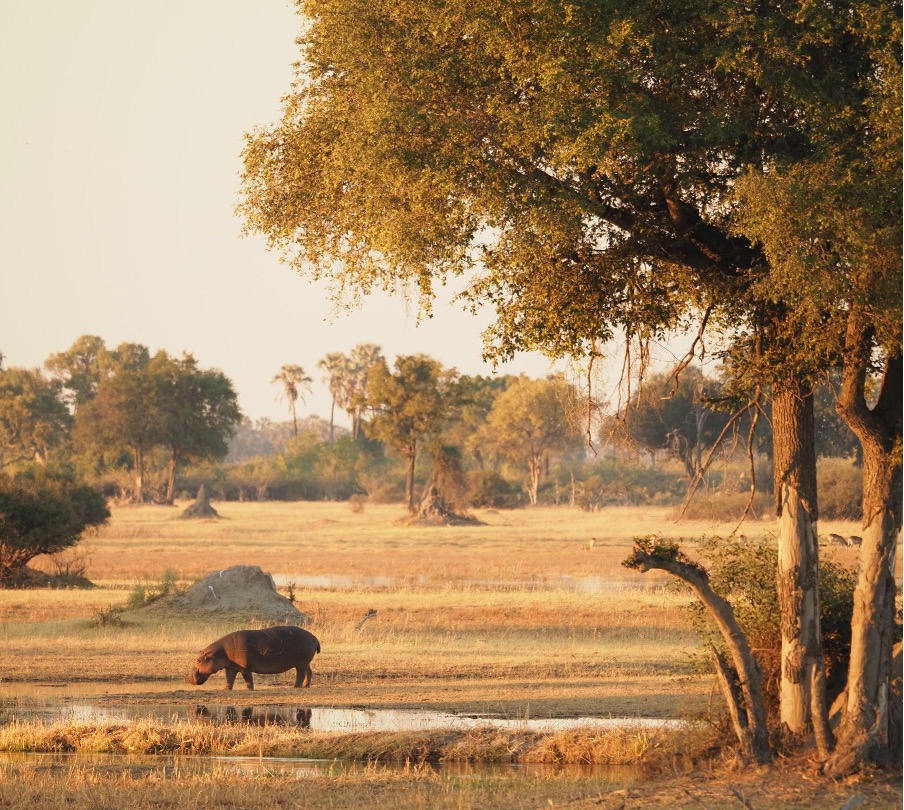
Whether you've been dreaming of trekking with the mountain gorillas in Rwanda, seeing the Great Wildebeest Migration in East Africa in your epic 'Out of Africa' moment, visiting a baby elephant orphanage in Nairobi, running down giant sand dunes and experiencing the extraordinary Skeleton Coast of Namibia or losing yourself in the stunning, wildlife-rich wetlands of the Okavango Delta or seeing the big cats in the wild, we've got you covered for safaris all across Africa that make a difference. The only problem is, with so many choices of places to see in Africa, how on earth do you decide? That's where a chat with us can make all the difference. With decades of experience and a deep passion for Africa, we love talking to people about making African dreams come true. Many of our guests have booked their safaris with us to Rwanda, Botswana, Tanzania, Kenya, Namibia, Zimbabwe and South Africa over the years and we pride ourselves on the fact that our guests keep coming back. There's so much to explore in Africa and once you get started it's hard to stop!
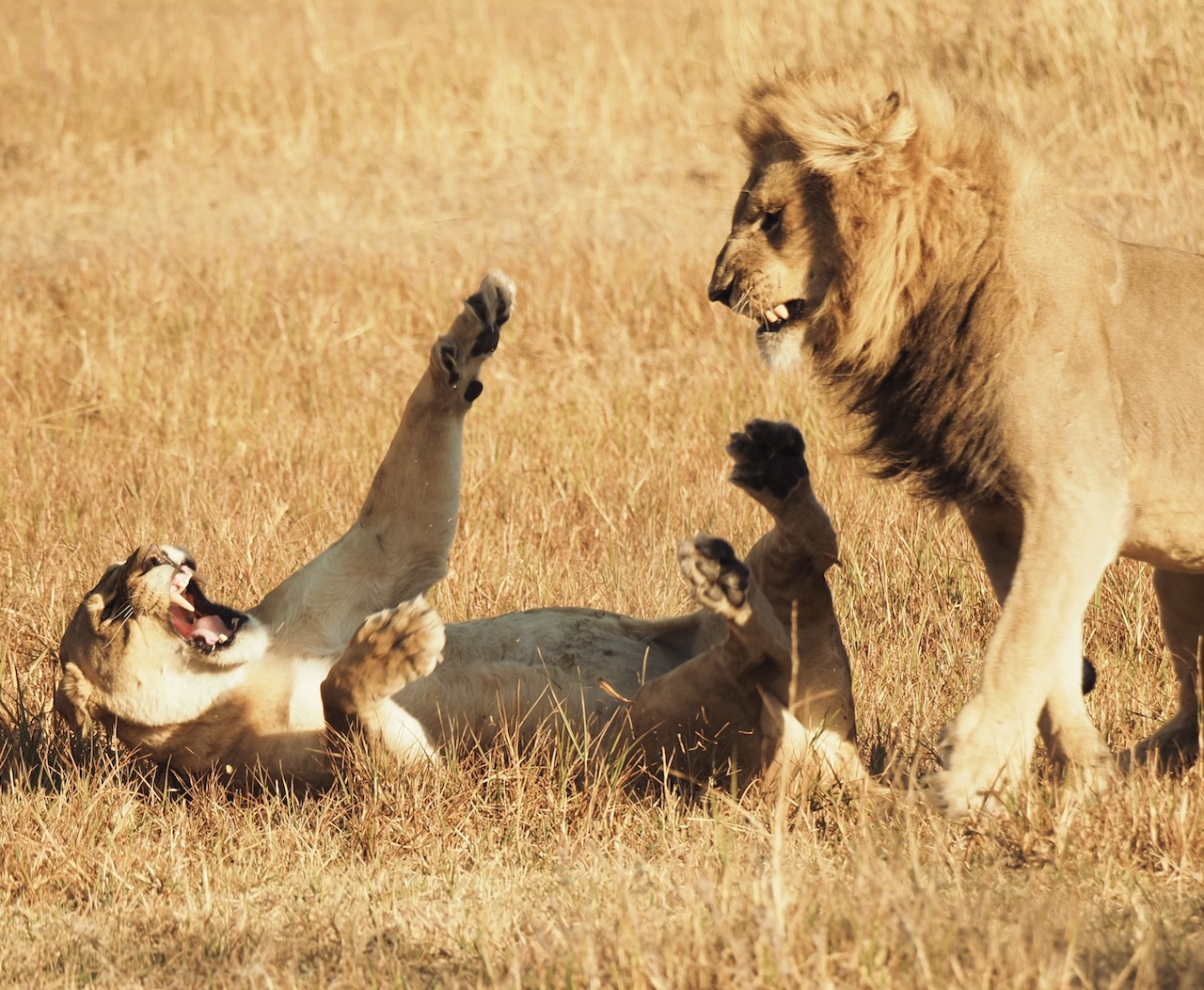
We live in an increasingly fast-paced, industrialised world, and daily life often feels dominated by technology, financial pressures and the need to GO-GO-GO. It can all feel a bit overwhelming at times, which is why many of us find ourselves more and more gravitating towards the natural world as we get older to find a sense of peace in the craziness of life. Being in nature is a great antidote to modern life stresss and being an active participant in nature conservation carries a strong sense of purpose with it. Many of our guests have told us that this is why they book with Matson & Ridley Safaris. Conservation is, and always will be, central to our mission. Our conservation work doesn’t happen without you, our nature-connected community.
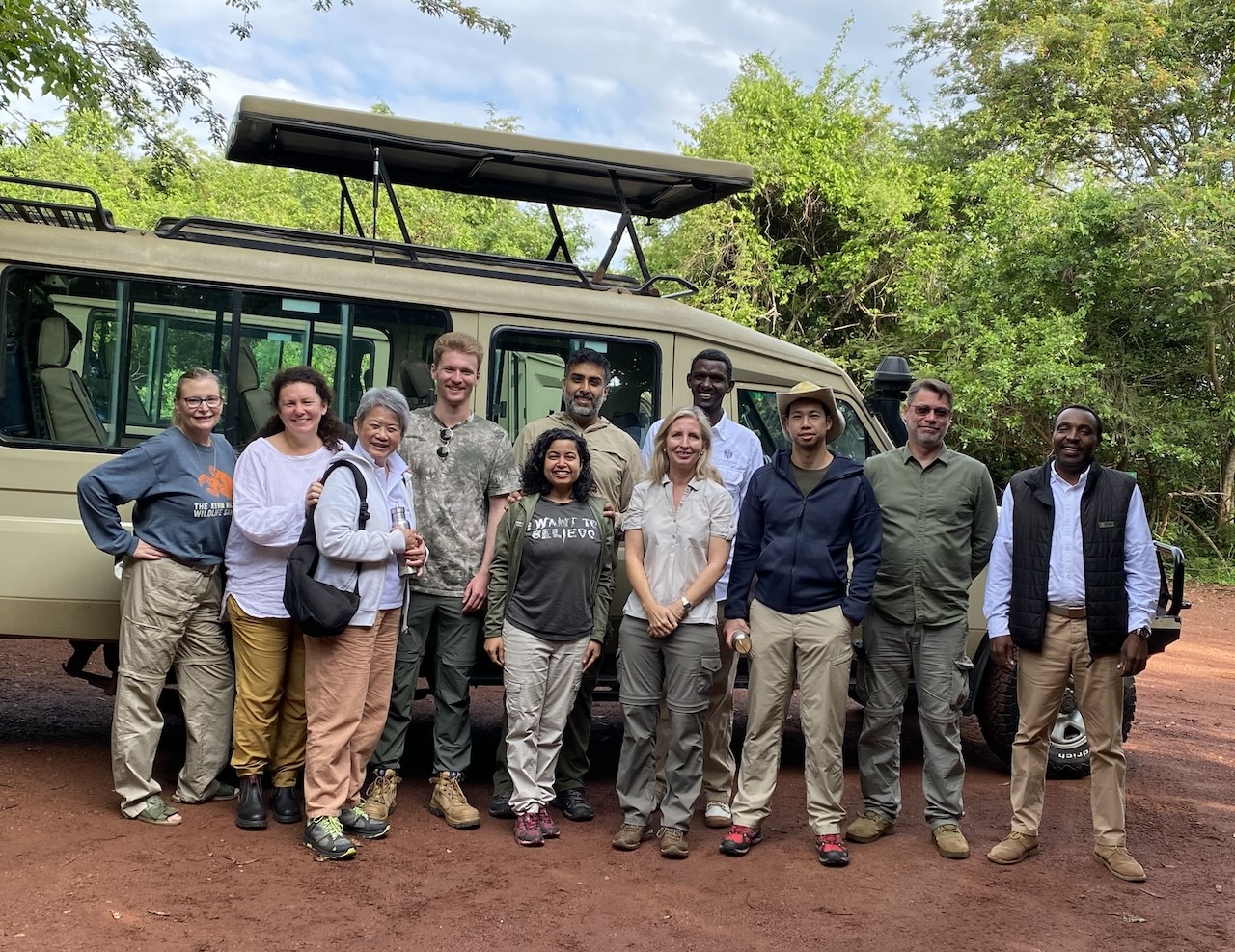
Above: My awesome elephant conservation group on safari with me in Rwanda with me in 2022
Over the past few decades of living and breathing conservation in our work and lives, one of the things Andy and I have learned about how to maximise our impact in conservation is the importance of working with local, experienced partners on the ground. In 2014, when we started Matson & Ridley Safaris, a business founded in Singapore (later moved to Australia in 2017), our goal was to work with trusted partners in Africa who shared our values around working with local communities for wildlife conservation to achieve conservation through high value tourism. Over the years, through the safaris that our guests have booked with us, we have contributed millions of dollars to conservation in Africa. This approach to conservation ensures that local people benefit from the wildlife economy generated by tourists in a sustainable way. It transforms areas that were once depleted of wildlife due to poaching into wildlife refuges where local people work in the lodges or as rangers. Conservation tourism in partnership with local communities has been a game changer all across Africa where it is done well, in countries including Botswana, Namibia and Rwanda. If you've ever been on safari with me, or on a safari I booked for you, you will have seen this first hand.
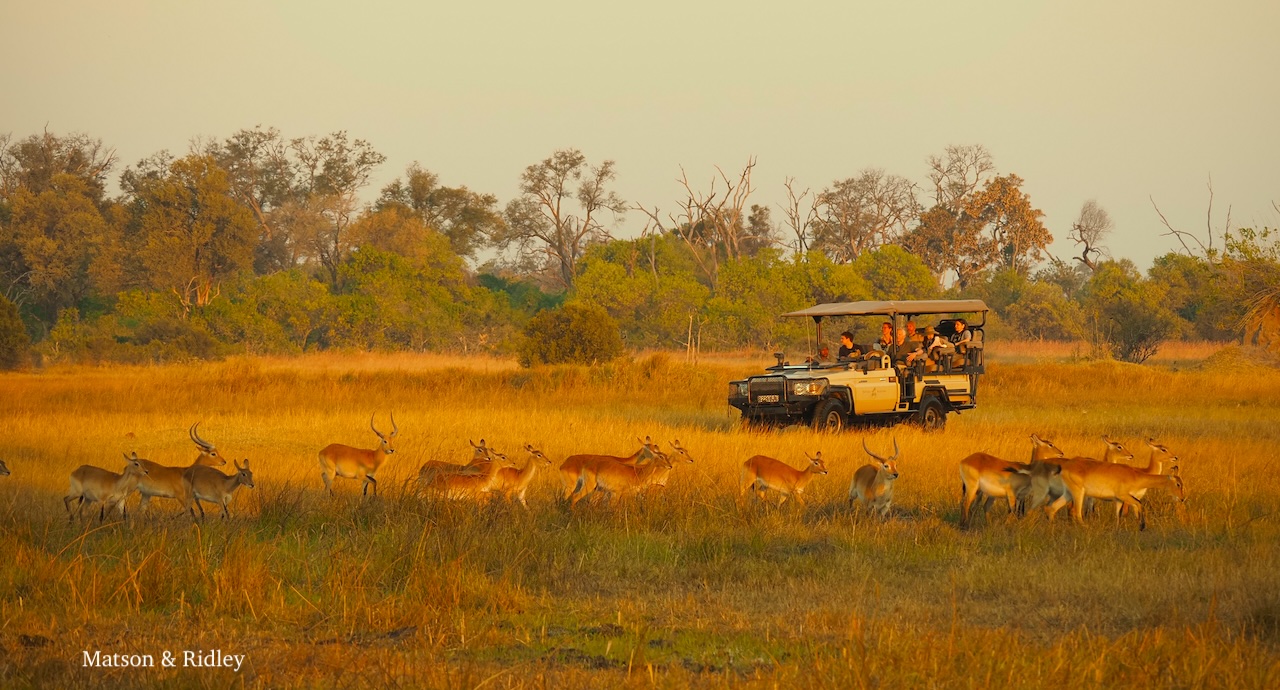
__________________________________________________________
The Akagera Elephant Project, Rwanda
On top of our core business of conservation tourism, we have also supported and, in some cases led, the development of meaningful conservation projects where needed, such as the Akagera Elephant Project, based in Akagera National Park, Rwanda since 2018. This project, which quite a few of our guests joined me on to assist with data collection over the years, developed the foundations of the first elephant identification database for the national park, alongside our partners in the Akagera Management Company and the local Akagera guide co-operative. The project collected the first baseline data on individual elephants in the park to complement work that the Akagera Management Corporation undertakes as part of their management of the elephant population.
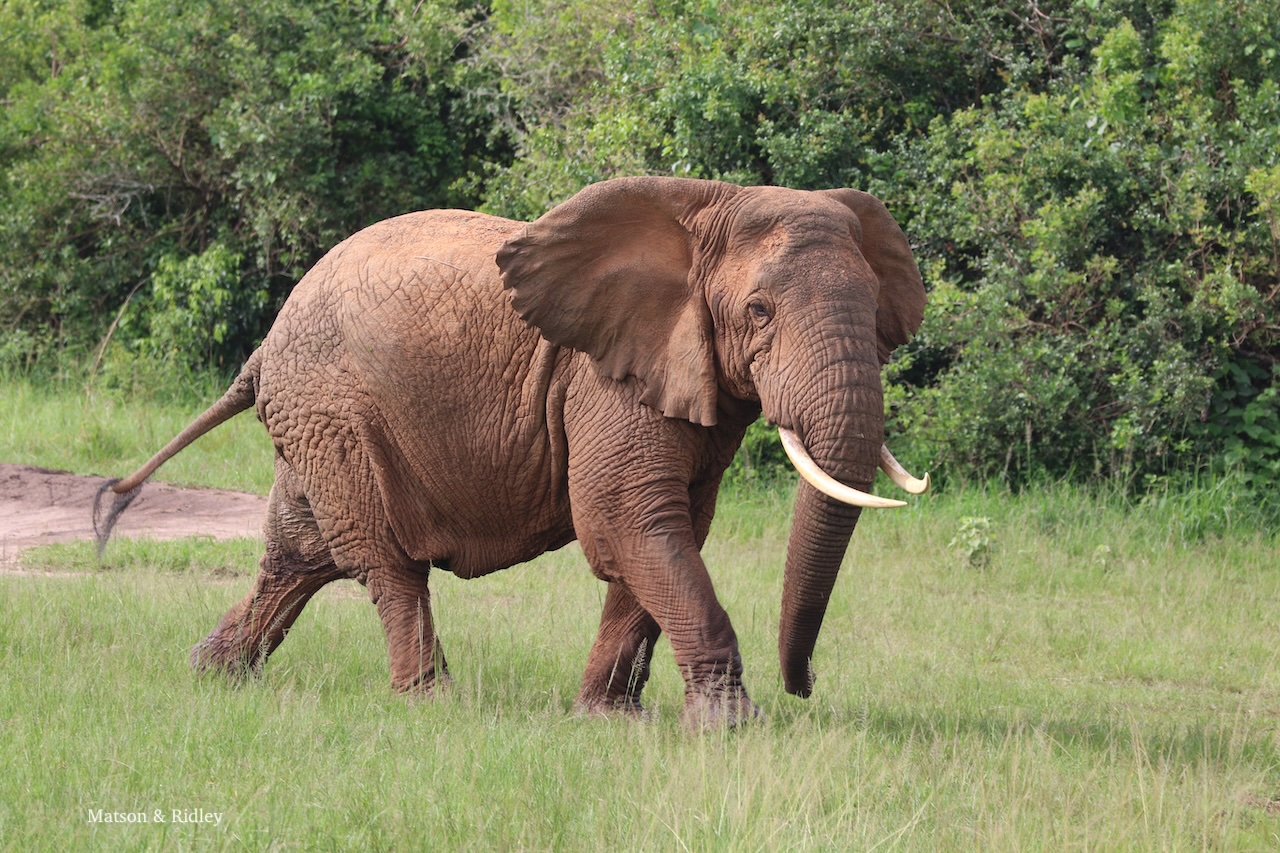 During Covid, when there were no international tourism dollars coming into Africa, many of you reached out when we asked for your help for the local Akagera guides and their families in the communities bordering Akagera National Park. Our Covid relief program donated basic grocery supplies including food and household supplies. This made a huge difference to these families during a very difficult time.
During Covid, when there were no international tourism dollars coming into Africa, many of you reached out when we asked for your help for the local Akagera guides and their families in the communities bordering Akagera National Park. Our Covid relief program donated basic grocery supplies including food and household supplies. This made a huge difference to these families during a very difficult time.
A couple of very special guests have gone the extra mile in supporting the Akagera Elephant Project through my practical training of local guides in elephant identification in late 2022, and more recently in the sponsoring of a local elephant co-ordinator, Emerance Tuyipfukamire, to undertake regular field work and data analysis of the elephant population in Akagera. We are enormously grateful to our sponsors for this support. The need for a local qualified person to continue with the elephant work on the ground was something I identified early on would need to happen in the evolution of the project and we were grateful to have the support of the park in enabling this to happen in partnership with them.
Emerance was recruited to co-ordinate the elephant work in the park as part of the Akagera Management Company’s research team a few months ago, with her elephant work funded by us. She was selected from a large pool of applicants after an extensive interview process. Emerance has a Bachelor of Science from the University of Rwanda and also has experience working with the mountain gorillas in Rwanda. We are excited to have Emerance on the team as an emerging young, enthusiastic conservationist in Rwanda and taking the lead on collecting elephant identification data and analysis in Akagera and she will continue the work we started with the guides in the park to build local capacity for elephant conservation.
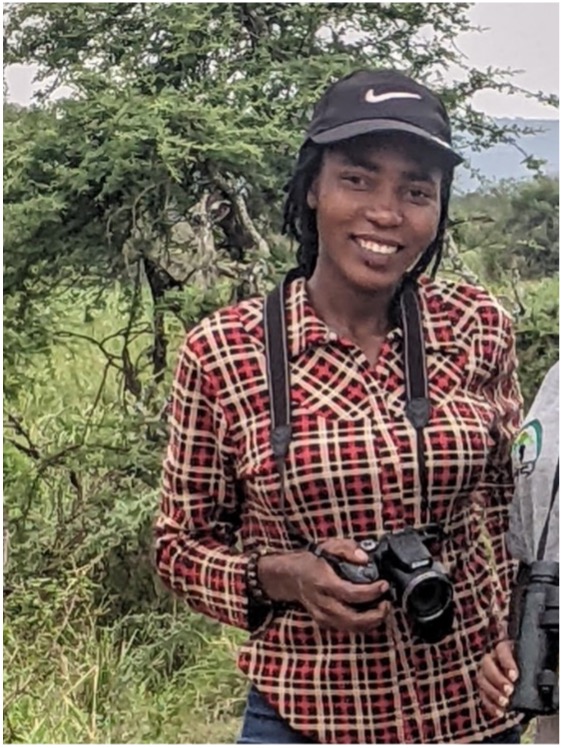 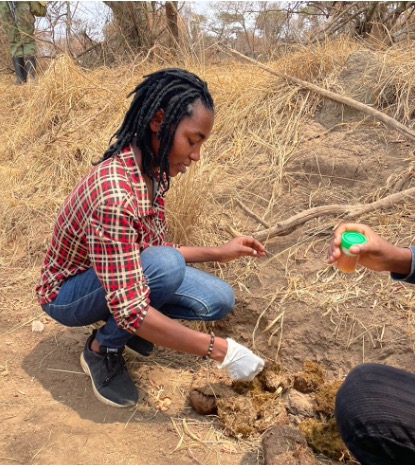 |
__________________________________________________________
The Triumph Conservation Trust
In other big news, Andy and I are excited to share that this month we started the Triumph Conservation Trust in memory of Andy’s Uncle Nigel. Professor Nigel Ridley-Thomas was a pioneering and highly respected geophysicist who spent most of his adult life in Hong Kong. He was also a great nature lover who cared deeply about the state of the planet and our impact on it. The Triumph Conservation Trust will be dedicated to wildlife restoration in both marine and land ecosystems across the world and we look forward to sharing more about it with you in the coming months.
For now, I can say that in its first year the Triumph Conservation Trust will support the Great Reef Census as part of Andy’s ongoing work at Citizens of the Reef to help restore coral reefs in the face of climate change. The Trust will also support a high impact conservation tourism project in southern Africa that will work with local communities to restore wildlife in vital habitat for African elephants and many other species (more details to come soon!). We are very excited to be able to provide a legacy for Nigel’s passion for the environment and we look forward to sharing more about our plans in the months to come.
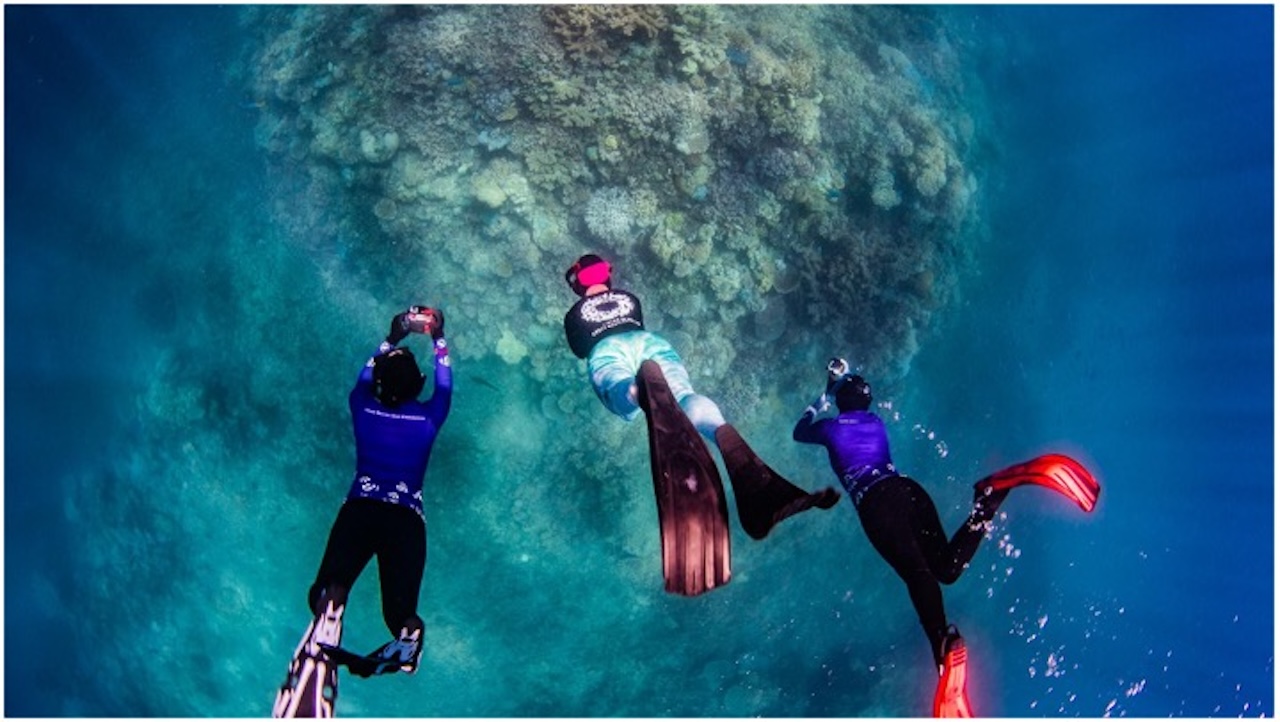
Above: Photo of participants in the Great Reef Census by Citizens of the Reef
In the meantime, we have some great deals for safaris in Kenya, Tanzania, Botswana and Namibia at the moment, not to mention amazing gorilla trekking experiences in Rwanda. Please reach out to book your safaris for 2025 and 2026 and we’ll make sure your safari dollars go the extra mile for wildlife conservation. I have two rooms left on my Tanzania safari in May/June 2026 for those who want to join me in search of the big cats and the wildebeest migration in the Serengeti, Grumeti and Ngorongoro. I also have space for my Botswana safari in June 2025. Reach out for details!
Contact us about a safari today 😀
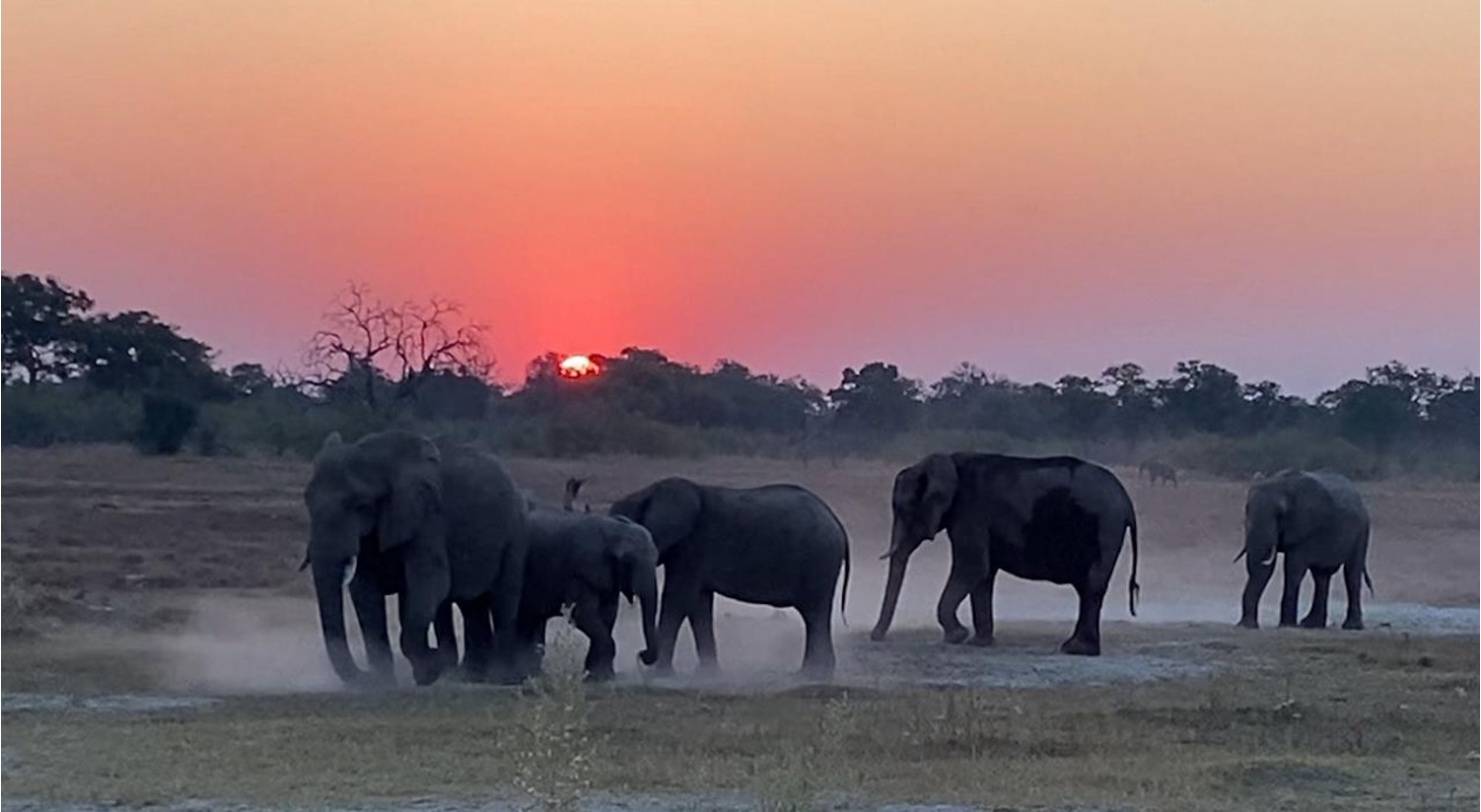
You may not be surprised to hear that getting up in the dark at the crack of dawn is not something my kids ever do in our normal day to day lives. On school days, I'm lucky to drag them out of bed in time to get them there before the school bell rings. So it says a lot about the level of excitement and allure of an African safari that my boys were up on their feet every single day and ready to jump in our open game viewer for the morning game drive, even on chilly winter mornings!
Solo is 14 and Shep is 10 now and Andy and I have been taking our boys on safari since they were very young. Over the years we've been fortunate to share journeys with them in Rwanda, Kenya, Namibia, South Africa and this year it was finally time to explore Botswana with them. The privilege of this is not something we ever take for granted as a family and we're enormously grateful to our partners in Africa and in this case, Natural Selection, who took such amazing care of us on safari in Botswana. Botswana has so much to offer for family safaris.
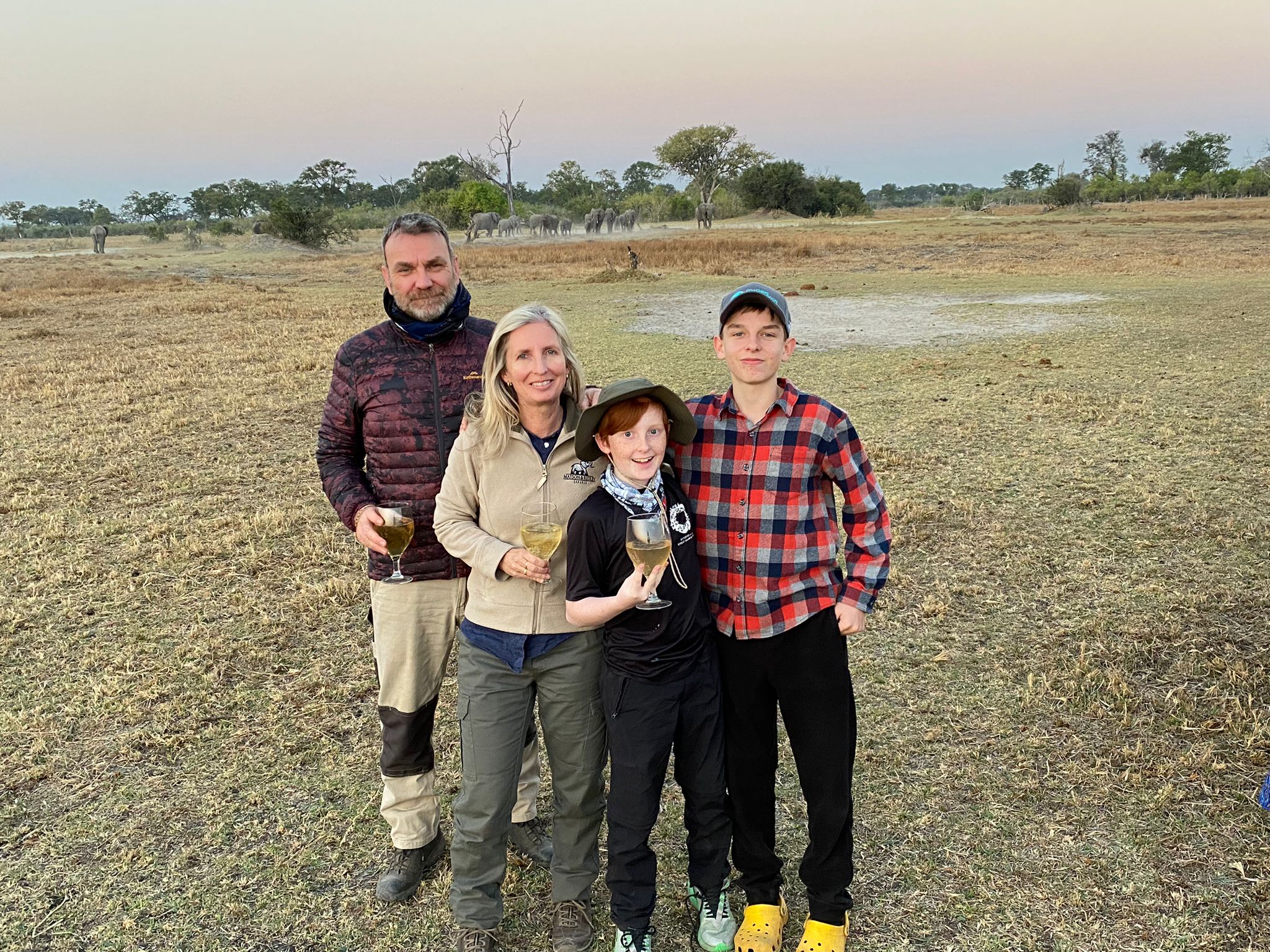
Above: Sunset with elephants (by the way, that's ginger ale in Shep's glass, in case you were wondering!)
Botswana is actually a great first safari if you've got kids in tow because it's relatively safe, easy and provides wildlife in droves to keep those short attention spans occupied. Some safari camps have a minimum age (six) or will ask you to take a private vehicle if you have young kids. The sort of memories and family bonding you get on safari is like no other experience, so my advice if you have kids is don't keep putting it off! There's so much to see in the African bush and the education kids get in these places from their local guides is beyond any biology lesson they'll get at school.
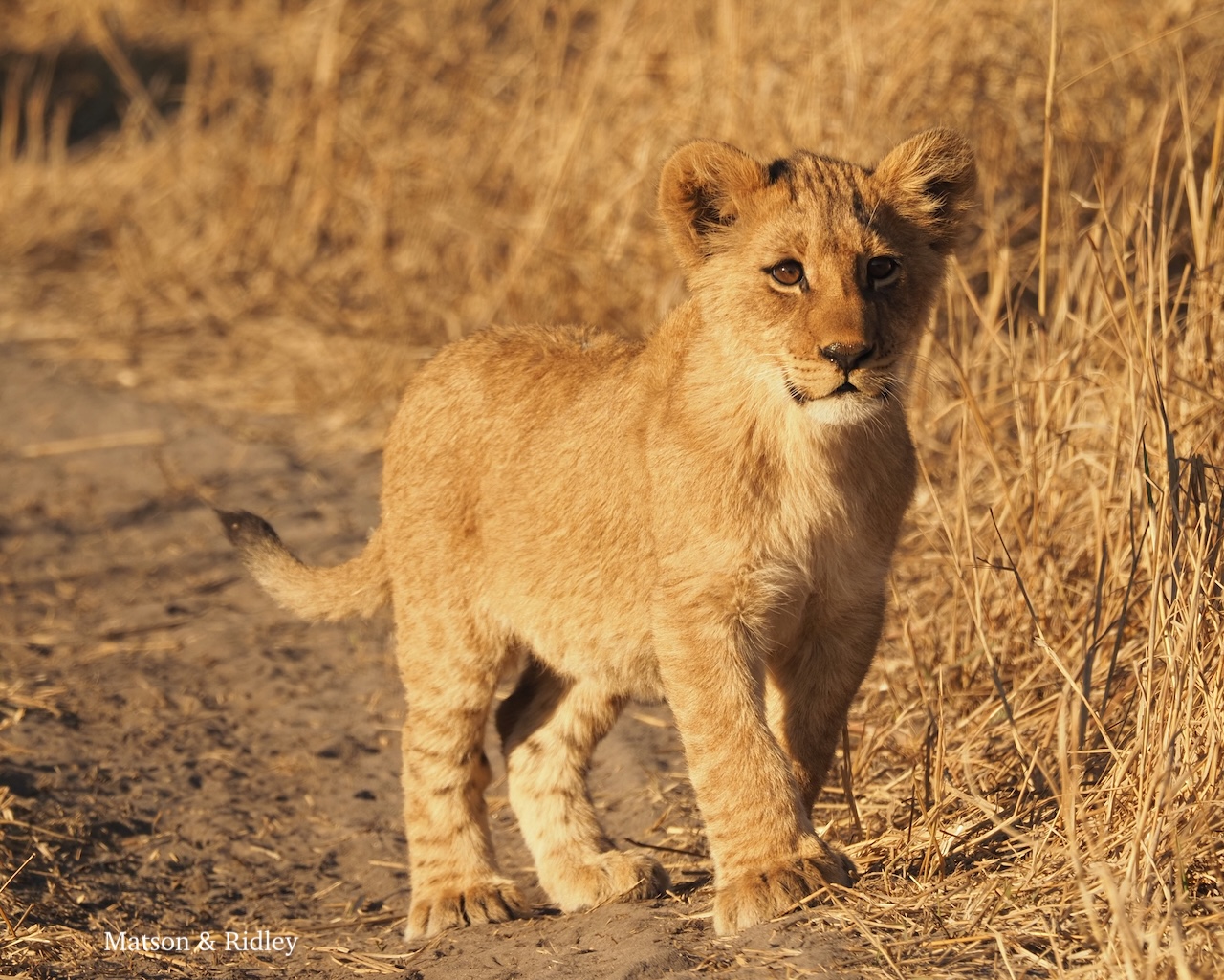
We kicked off our safari in Khwai Private Reserve, on the eastern side of the Okavango Delta, a wildlife-rich area that is owned by the Khwai community. The beautiful, family-friendly safari camp we stayed at, Sable Alley Camp, is a partnership between Natural Selection and Khwai community. I actually brought my first ever safari group to this area over ten years ago when it was managed by another company (back then it was Banoka Camp) and I was amazed on this trip just how many more animals there are there now, a result of extremely good wildlife management and a thriving conservation-focused tourism economy. The staff and local guides are from the Khwai community and they really know how to host and make families welcome. The family rooms were two interconnected tents with an adjoining deck, giving us plenty of space for everyone to chill on the afternoon siestas. This camp is named after the amazing sable antelopes that you can occasionally see in this area (see below).
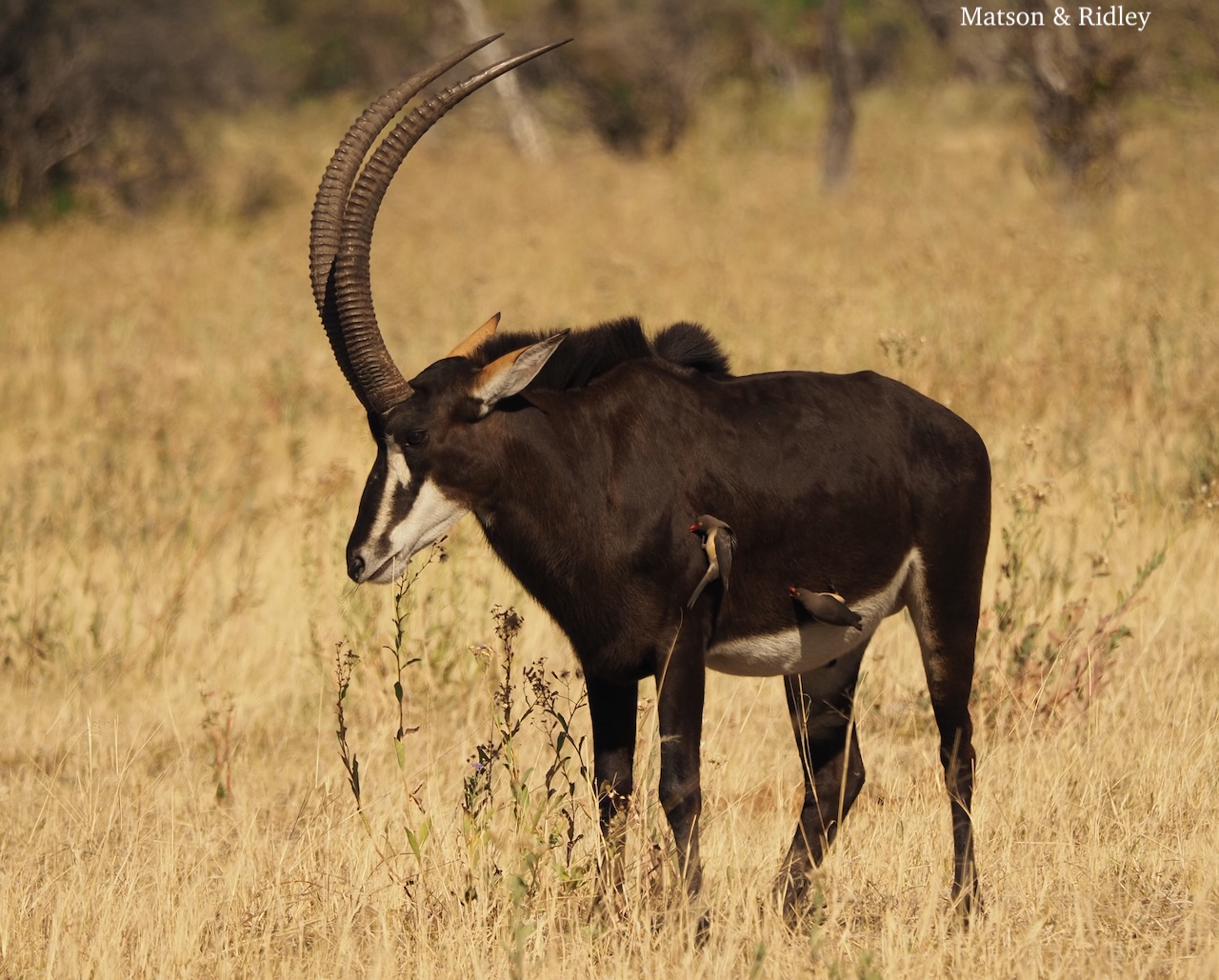
On our first afternoon here we found two lions and a lioness on a buffalo kill and I captured a fabulous moment when one of the lions walked within a metre of our open vehicle and literally looked right in to Andy's eyes (check out my instagram video here). It was good practice for Shep and Solo learning the rule about "no rapid movements" when you are in an open vehicle right next to lions as the next morning we found ourselves somehow in the middle of a lion hunt, with a pride of youngsters learning their strength as they tried to take down a Cape Buffalo right beside our car (unsuccessfully, which was good news for the buffaloes).

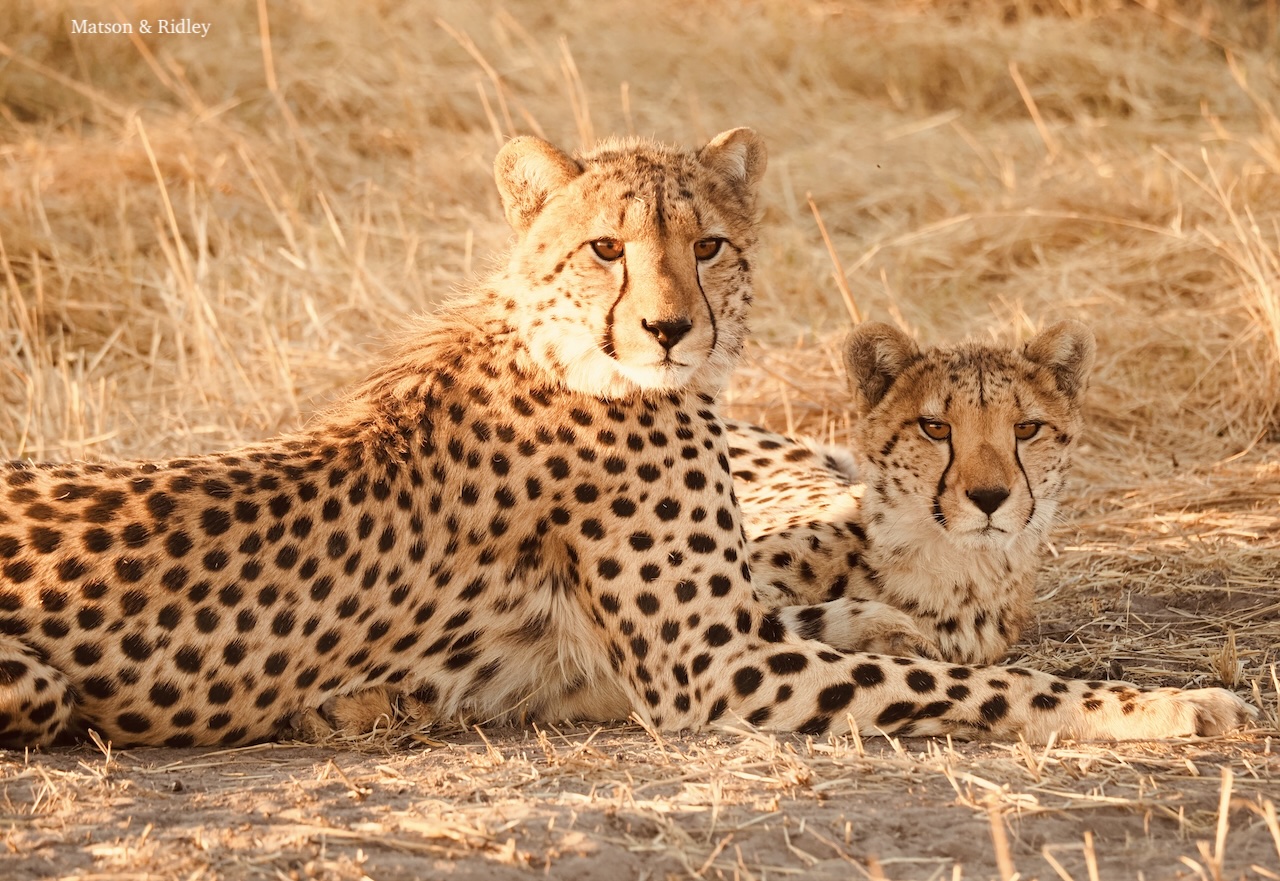
This area is excellent for elephants and the late afternoon game drives we had here included the most wonderful time spent just watching the big herds of elephants bathing in the Okavango Delta waters and covering themselves in dust. Combined with magnificent sunsets and an Okavango G'n'T and some snacks for the kids you'd be forgiven for thinking life couldn't get much better than this.
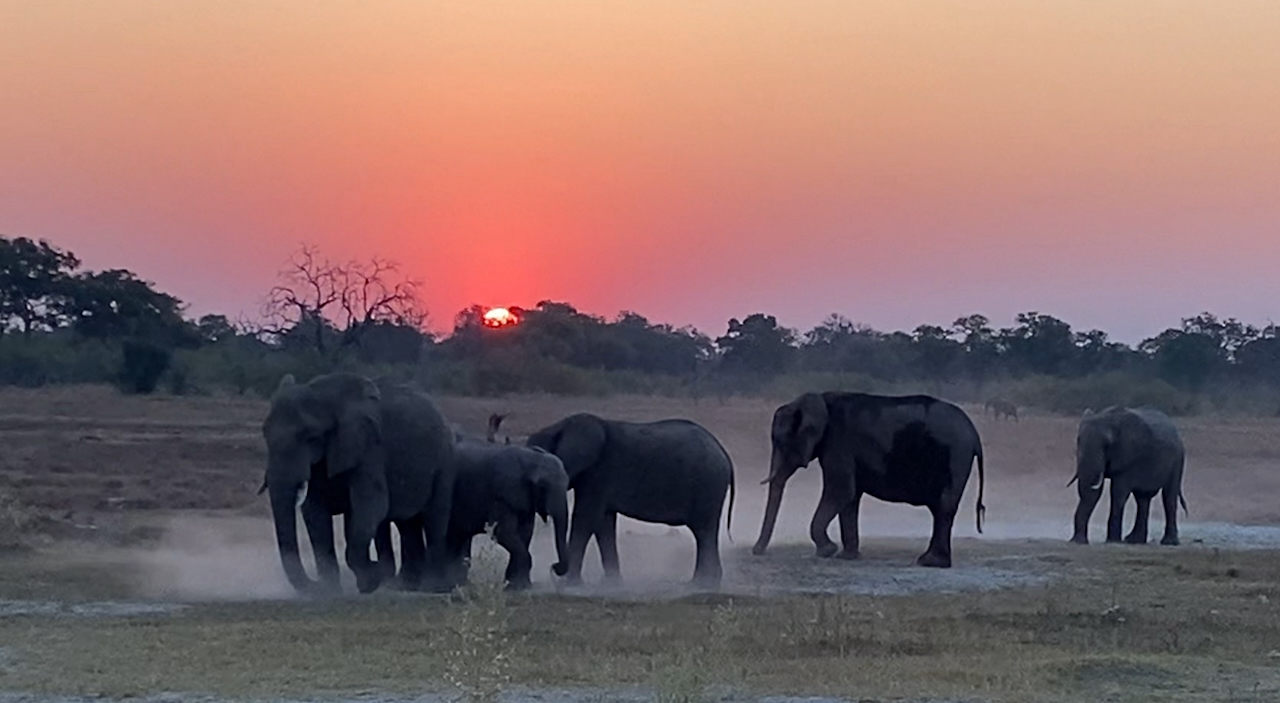
After a few days of awe and wonder with the big cats, wild dogs, leopards and elephants in Khwai Private Reserve, we set off to the Makgadigadi salt pans. This is an area I hadn't explored before and it didn't disappoint. If you've ever read the classic African book, "Cry of the Kalahari" by Mark and Delia Owens, you'll know the Kalahari and the area I'm talking about. We stayed at the luxurious Jacks' Camp and the down-to-earth Camp Kalahari while in the Makgadigadi Pans National Park. While the density of wildlife is not as high in the Kalahari Desert as the Okavango Delta, there's more than enough to provide fascinating game drives in this area. We saw lions devouring a fresh wildebeest kill, surrounded by jackals, and cheetahs that were moving through the area (a rare treat that our guide was really excited about). We also saw an elusive aardvark on a night drive. A highlight of this area is the habituated population of meerkats and this was something I was really looking forward to. There are few places in Africa where you can get up close to a wild population of meerkats like this and they are even cuter in the flesh than I imagined! This is a truly wonderful experience for kids on safari.
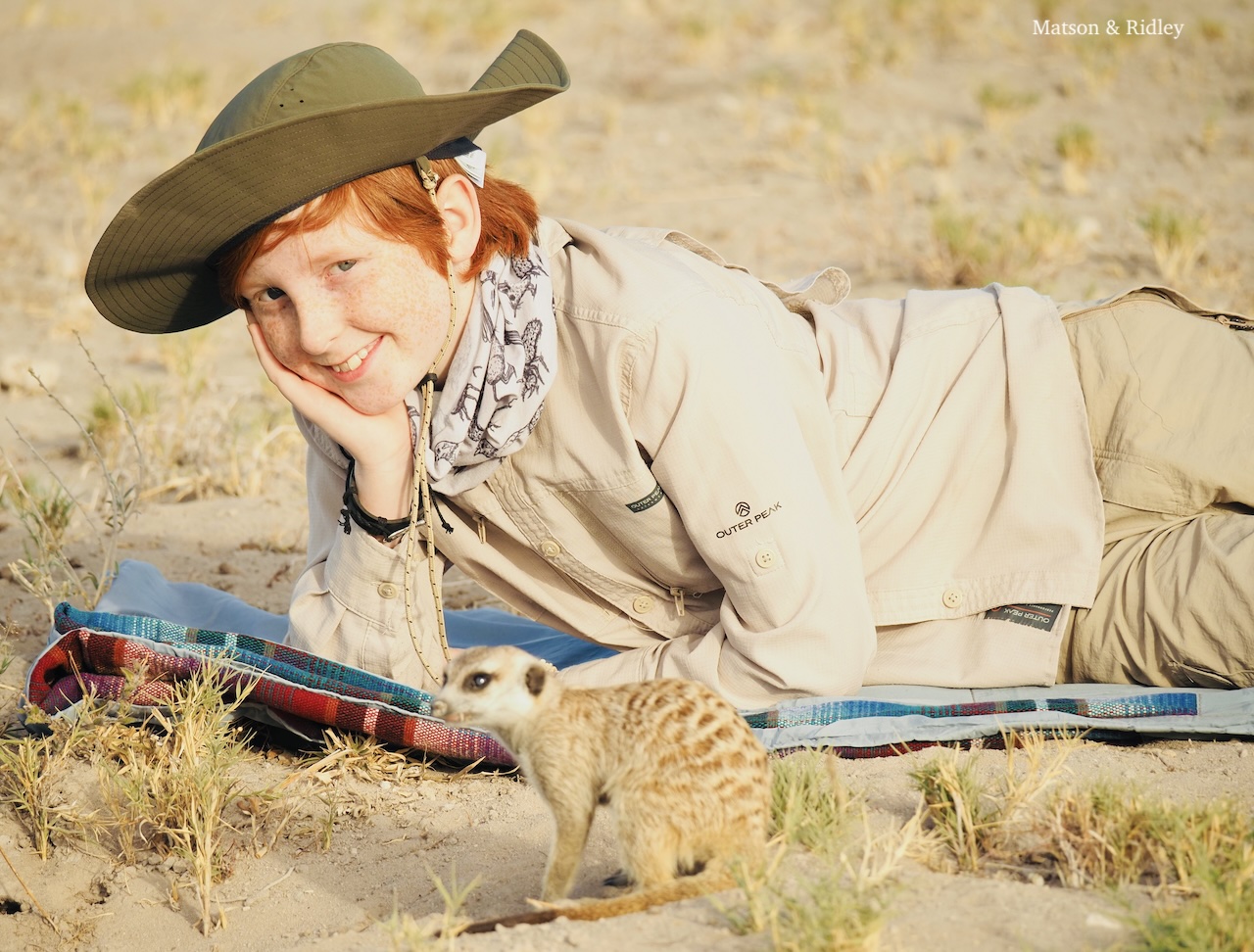
The salt pans are not typically an area that people go to on their safari as most people concentrate on the Okavango Delta, but we really loved this area as there's so much to do with a family. The clear night-time star gazing by the campfire experience, driving on quadbikes across the salt pans (and in our case playing the most remote game of family soccer ever), walking with the Bushmen and learning about their traditional uses of the plants and animals, riding on fat bikes (kind of like mountain bikes but with fatter tyres for sand, although not quite as cool according to our teenager) and the meerkat experience just added so much more in terms of activities.
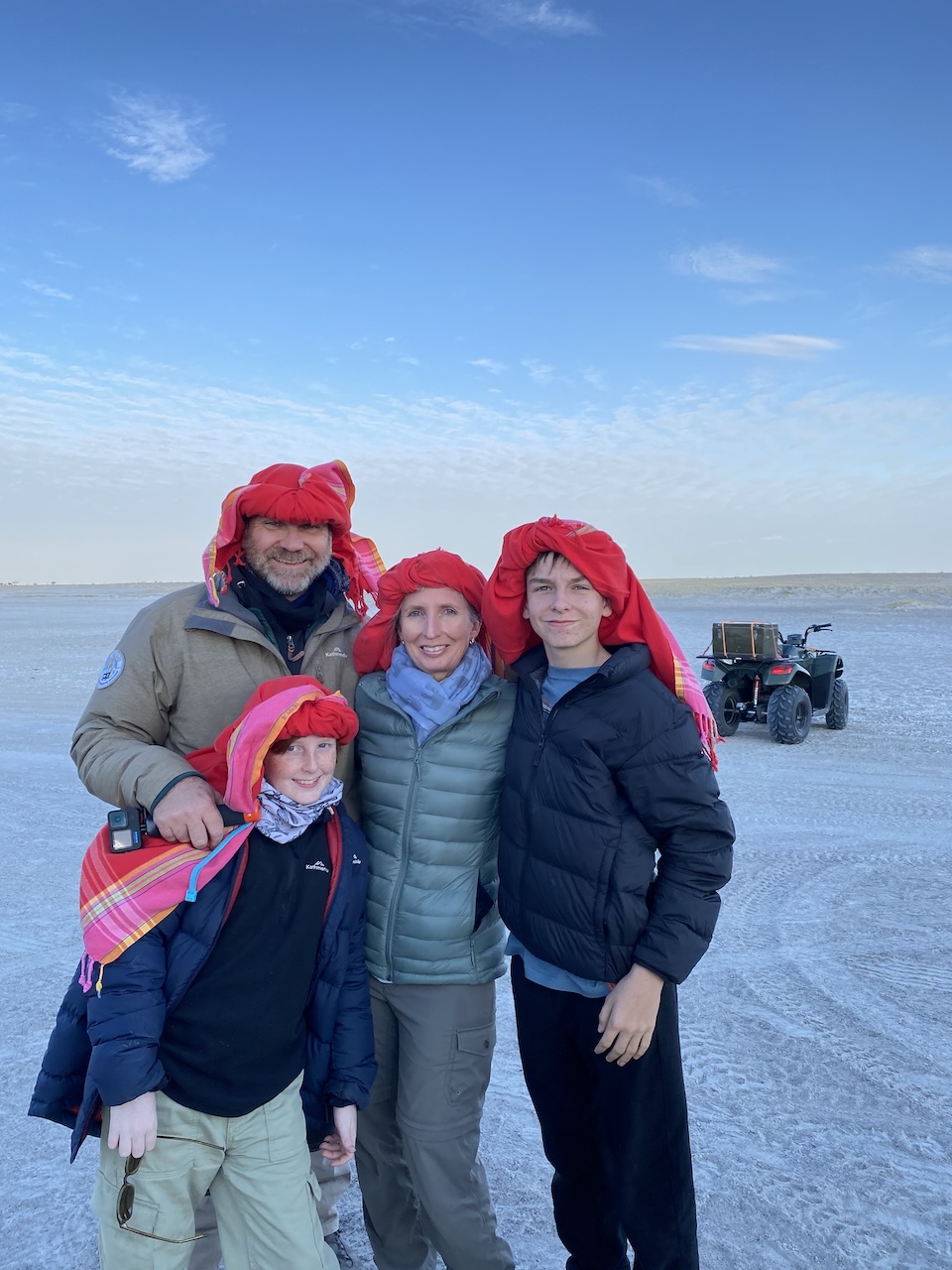
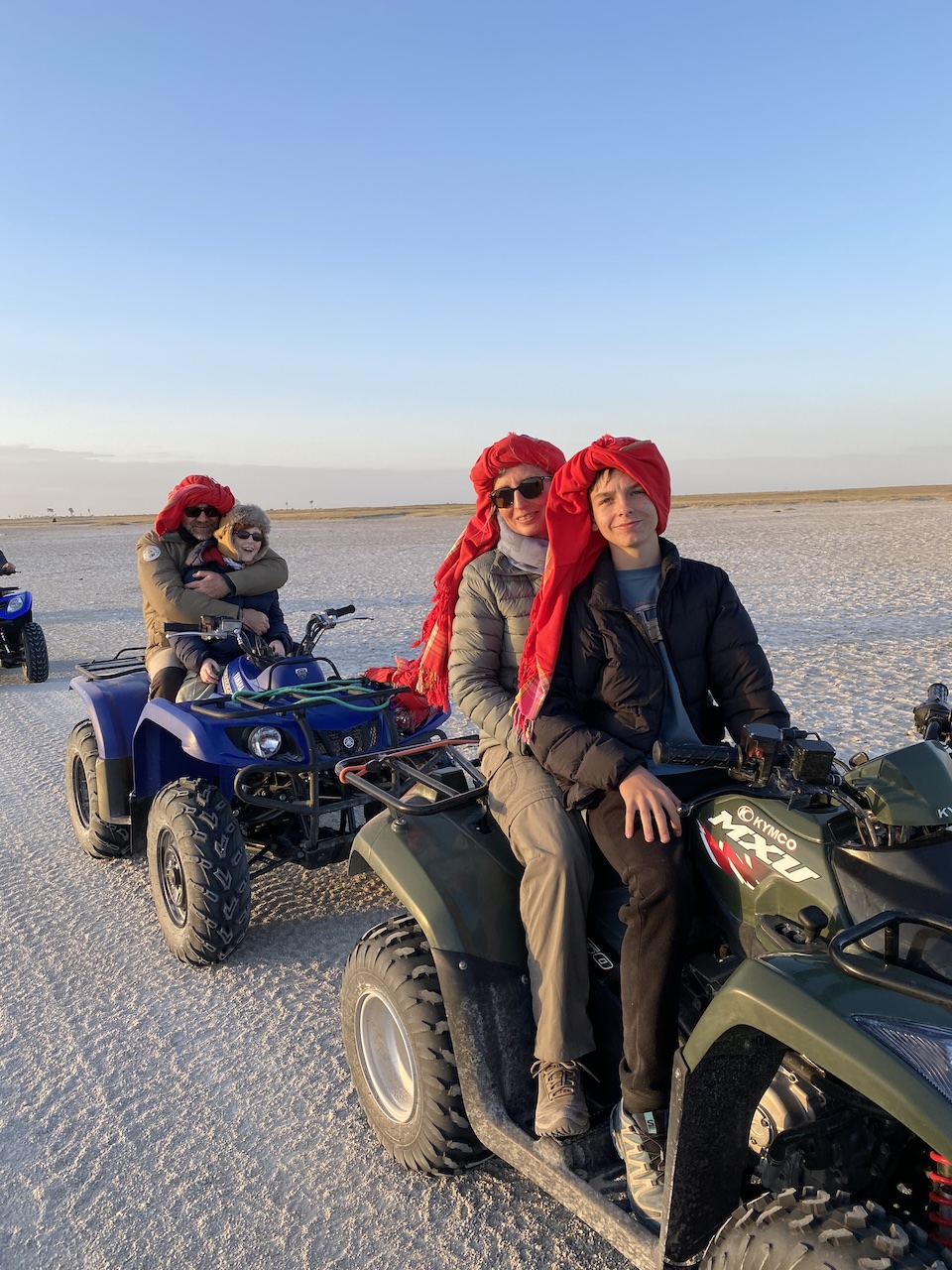
Above: Quadbiking on the Makgadigadi Pans was a highlight for the boys
Our third and final area was a new addition to the Natural Selection collection, their new premier Tawana Camp in the Moremi Game Reserve. This area was truly beyond belief in terms of the wow factor, not only the lodge which was truly gorgeous, but also the wildlife. Some days we would see African wild dogs, cheetahs, leopard and lions all on the one game drive. It's really a testiment to how well high value tourism and conservation have worked together to build up relaxed wildlife populations today, so much so that lions and leopards act like you're not even there. Have a look at the divine rooms at Tawana Camp in my new instagram video here.

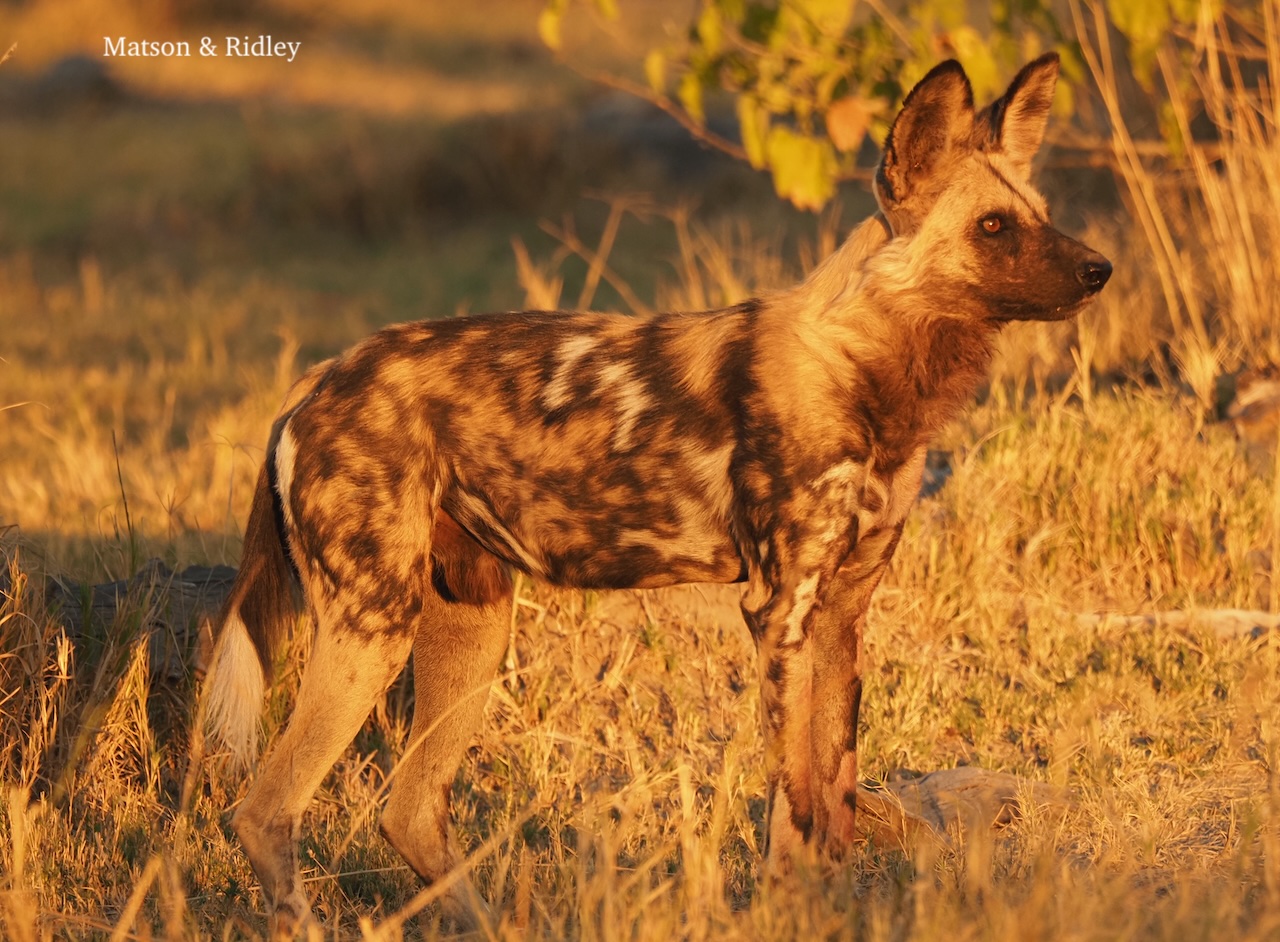
Family safaris are active, adventurous and incredibly memorable. Two months on and we are still talking about things that happened in Botswana. It's hard to explain why there's nothing like it, but it's got a lot to do with connecting to nature, getting out of your comfort zone and spending time with beautiful African people. Everyone should do this at least once in their lives.
As for our family safari in Botswana, the memories will stay with us forever. We won't mention the time that Solo dropped his little brother's camera lens cap out of the vehicle right next to a pride of lions.... What happens in the bush stays in the bush!
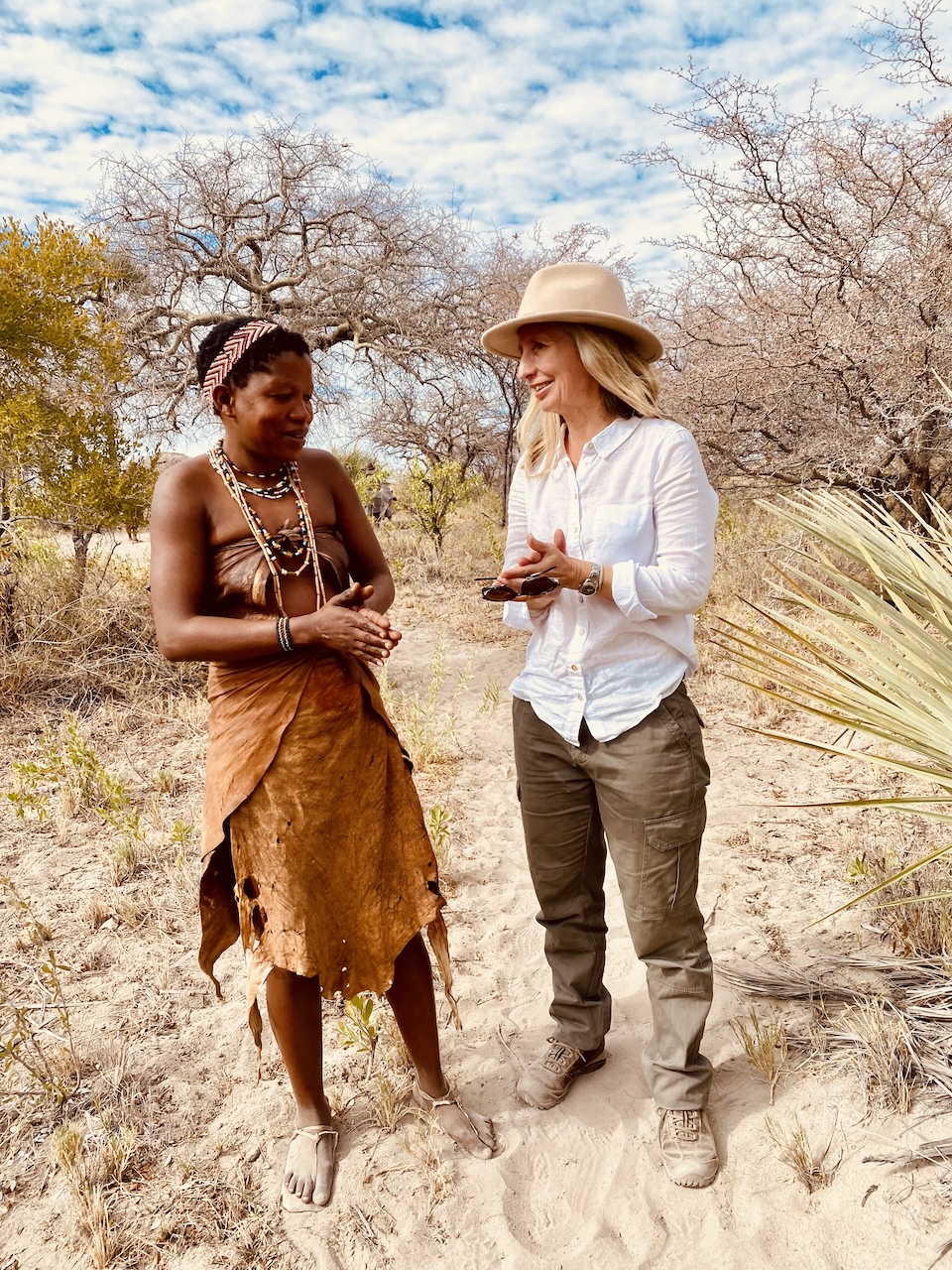
Is there anything as beautiful as sunrise in Botswana? Well, not much, but it can get even better when a hippo walks through the magestic, pre-dawn burnt glow, creating a silhouette only Africa can create in the wee hours of the morning as you set out on your game drive. Pure magic!

Every safari has its breathtaking moments, sometimes several in a day, and that, for me, is the joy of Africa. I like to call them 'joy explosions', those moments when you think your heart might literally leap out of your chest with happiness. My wonderful safari group this year made it yet another magical journey and their depth of appreciation of these moments was such a thrill for me. I can't tell you how much I love sharing my passion for Africa with others, even after three decades of African travels. Seeing people's faces light up when they see their first lion walk right by the open vehicle, or hear a spotted hyena call at night for the first time or see a herd of wild elephants enjoying a mud bath, is just awesome.
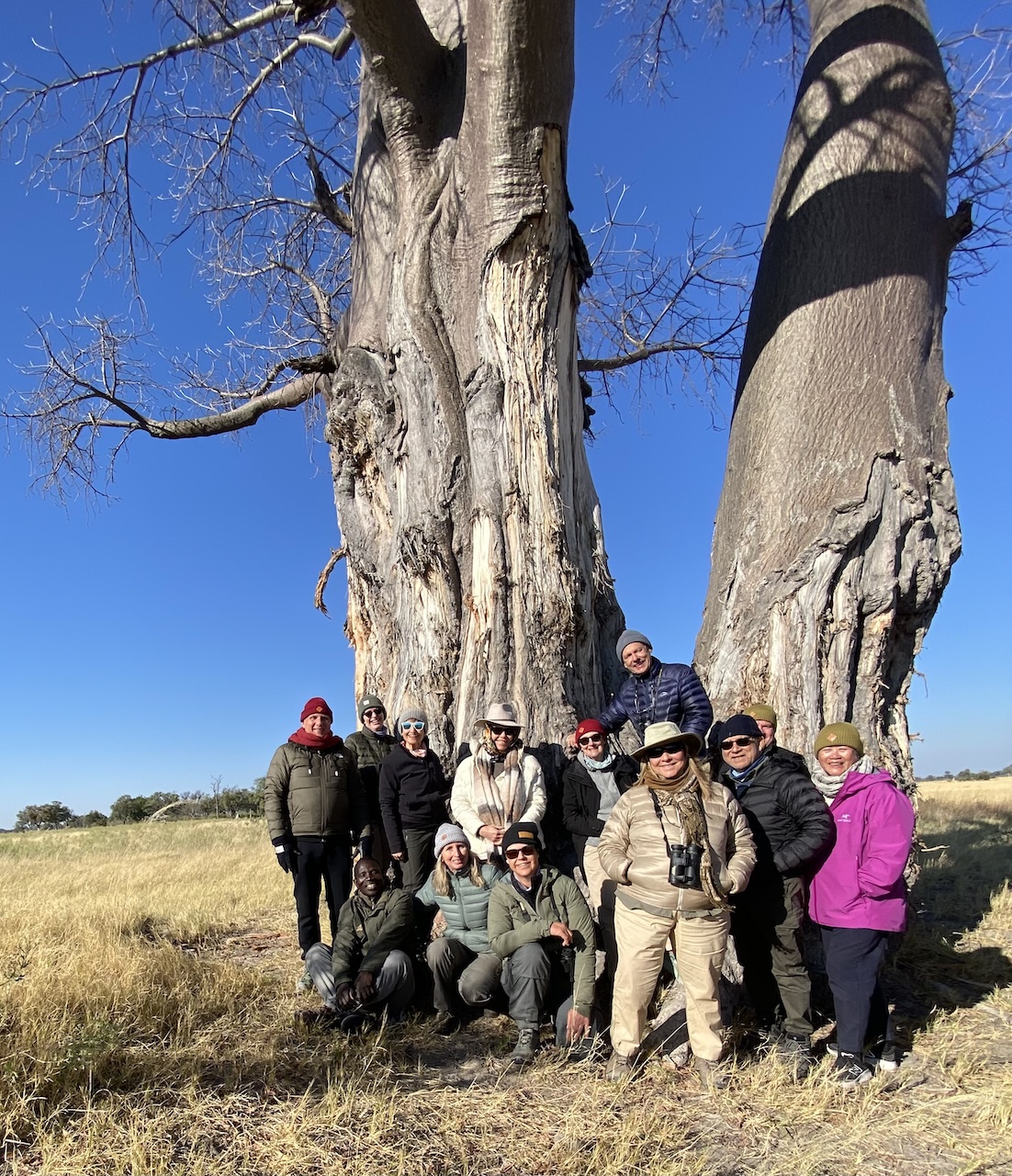
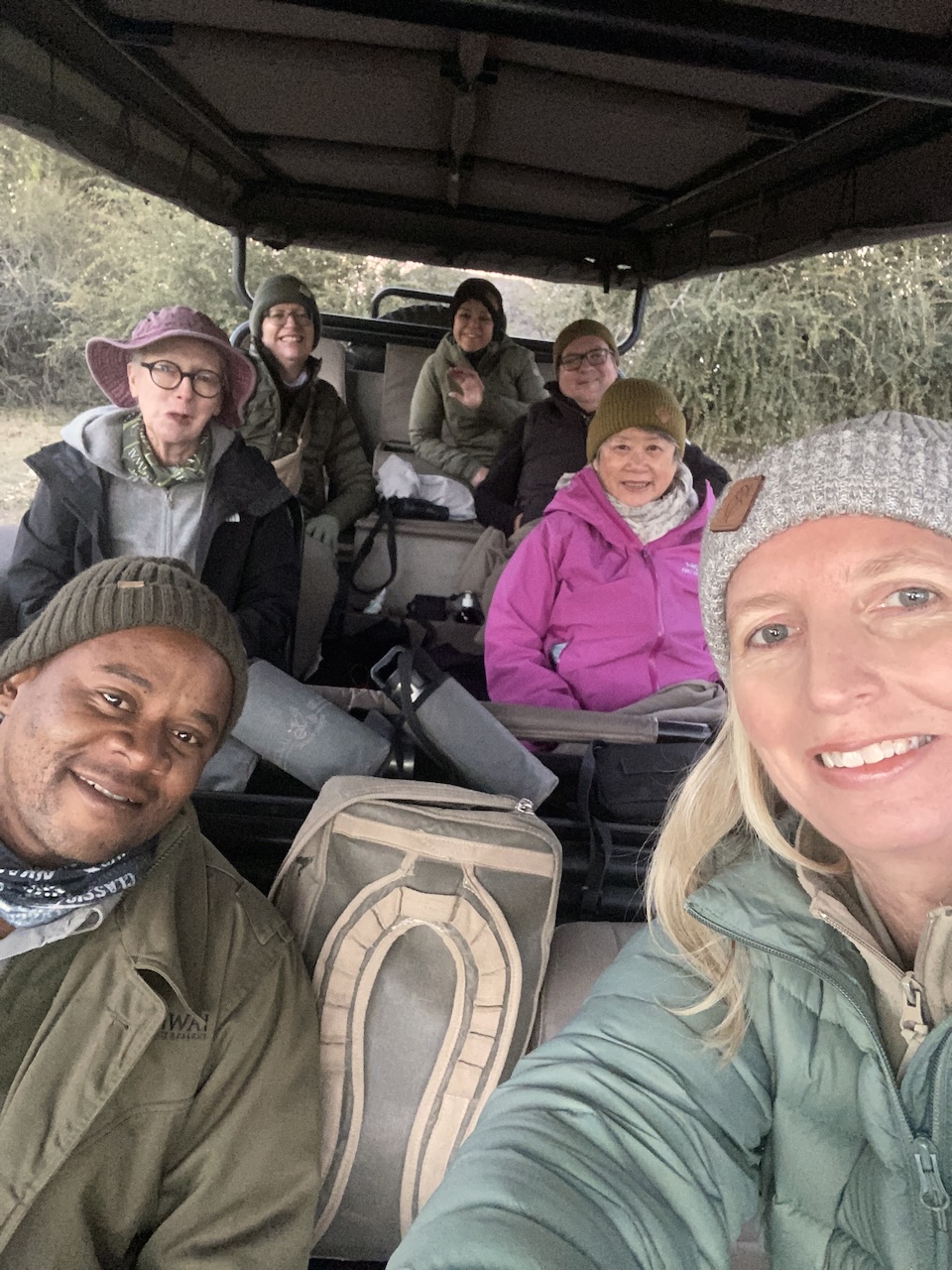
On this group safari we had a couple of very special encounters. One occurred at Mokolwane in Xudum concession in the Okavango Delta, a stunning part of Botswana where the recently released wonderful Netflix film 'Living with Leopards' was filmed. In our first evening in this area, after spending some waiting to see if a leopard we'd seen briefly cross the vehicle tracks might hunt an impala, we set up our sundowner drinks and nibbles in an area a little way away. There, in an open grassland, we all paused to watch and appreciate the sun set with an Okavango gin and tonic. While we were all relaxing and enjoying the sky turn peach, someone mentioned that there was a spotted hyena walking past a few hundred metres away.
As we all watched, the hyena stopped and looked at us for a moment, as if considering what to do next, and then changed direction and started walking decisively straight in our direction. All eyes were on it as it continued to walk towards us, closer and closer and closer. The carefree chatting stopped...
I glanced at one of our guides to determine if this was the sort of behaviour that hyenas usually exhibited in this area. He looked very calm as he told me we were fine. Everyone in the group stood perfectly still, which is pretty much what you should do in this situation. In the words of my good friend and author, Peter Allison, at times like this, whatever you do, don't run!
The hyena didn't slow down and continued walking towards our gathering until he was somewhere between five and ten metres in front of us. At that point, the hyena stopped. It lifted its head, probably smelling the biltong (dried meat) in our sundowner snacks, and considering whether it might constitute an easy meal. After about a minute, the hyena decided the small morsels of meat in our snacks weren't worth its time and it turned around and walked away in the same casual manner in which it had come. But wow, what an encounter and what a privilege to be the subject of this amazing wild animal's curiosity at such close range!
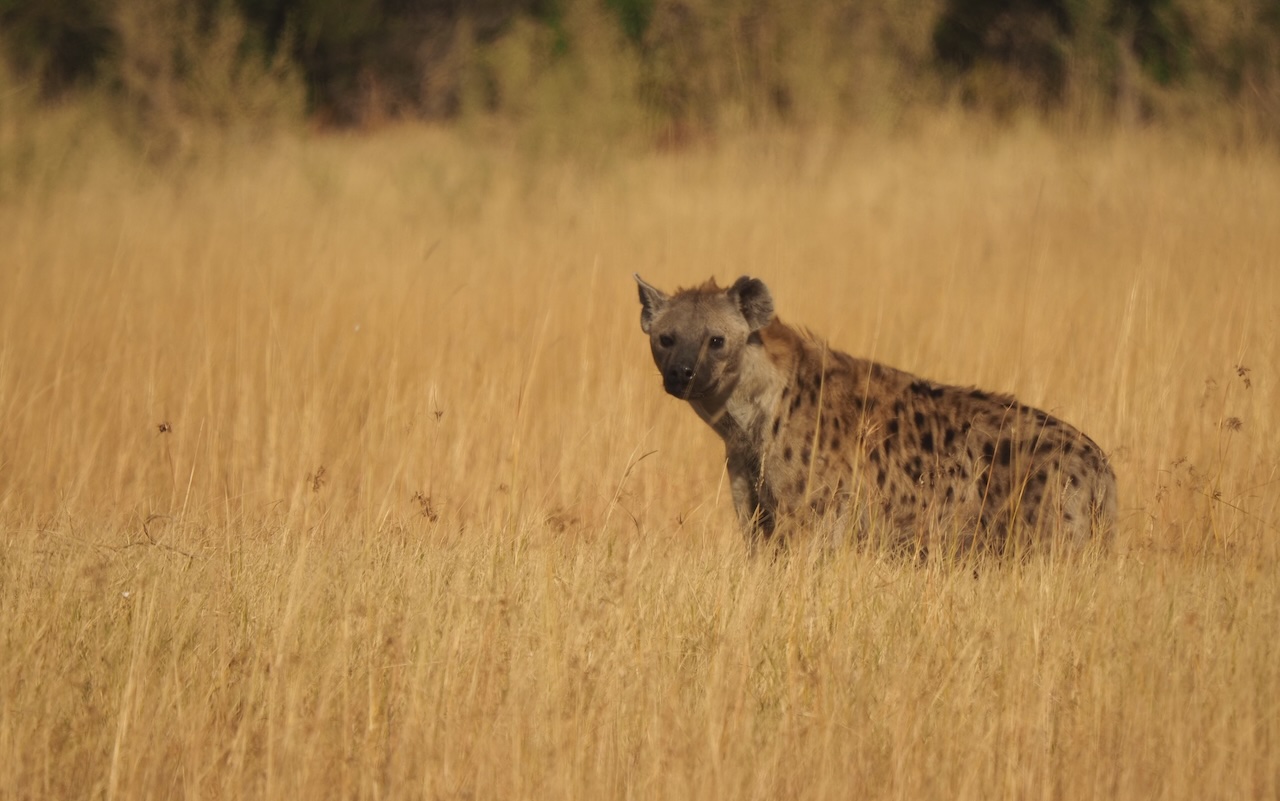
One of the things I loved about being in this area was the excellent and amicable working relationship between the Mokolwane safari guides and the film makers who were based there. We actually randomly ran into the film maker and one of the stars of the show, Brad Bestelink, in the bush at Mokolwane, while he (like us) was out looking for leopards!
The predator sightings in this area were outstanding, from African wild dogs at a den, rare sightings of cheetahs, several leopards and lion prides. We were very fortunate to see an aardwolf on one of our evening drives back to camp, a real thrill for me as I hadn't seen one for a couple of decades! A stand-out sighting was seeing two leopards stuck up a tree, under which a pride of nine lions were devouring a freshly killed warthog. The film makers who were there told us one of the leopards had killed the warthog, started to drag it up the tree when a lioness grabbed it off the leopard. The leopards did not look very happy as they were stuck up the tree, prevented from coming down by the lions, who were devouring their own kill right in front of them. Lions don't like sharing!
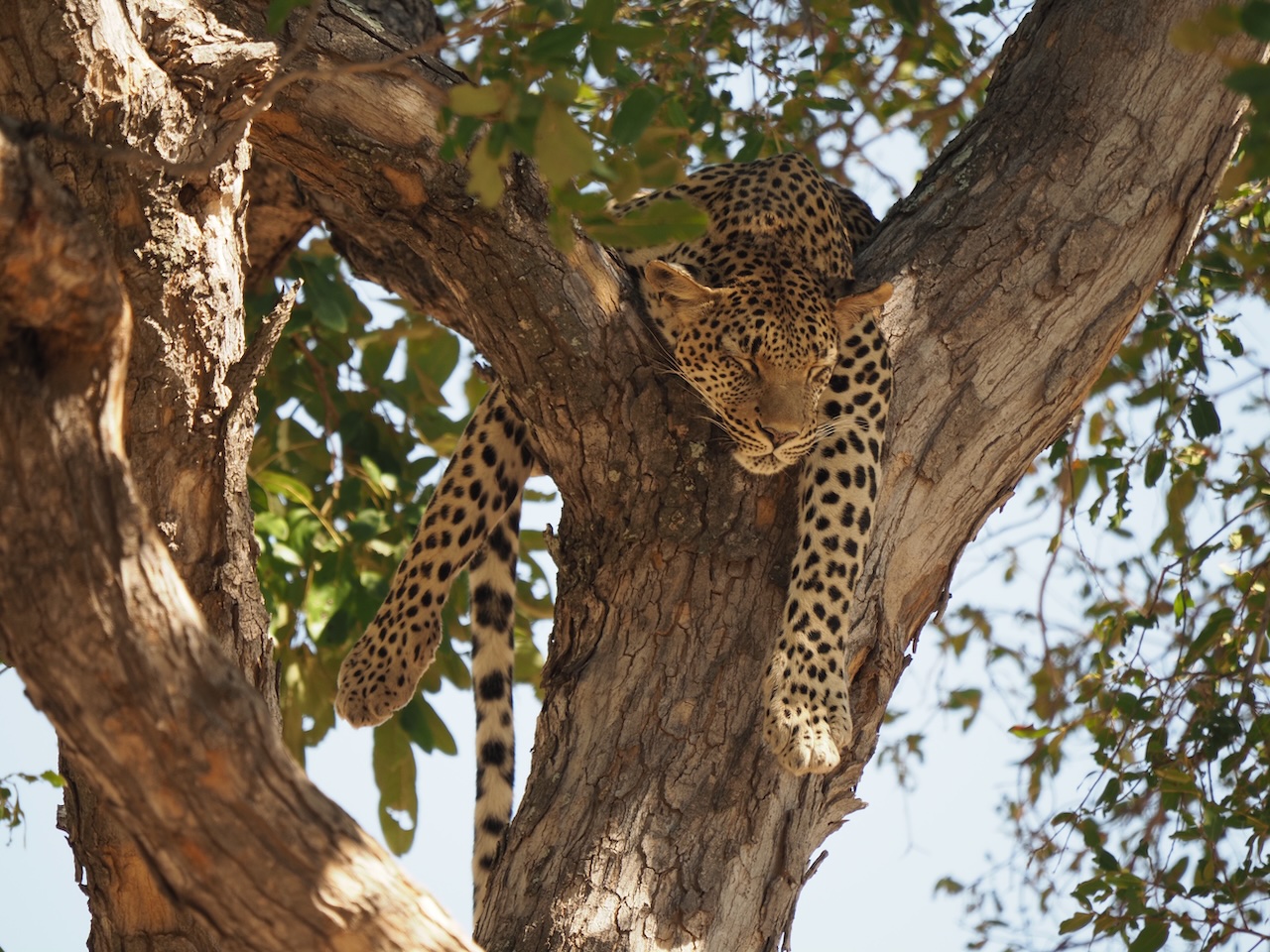
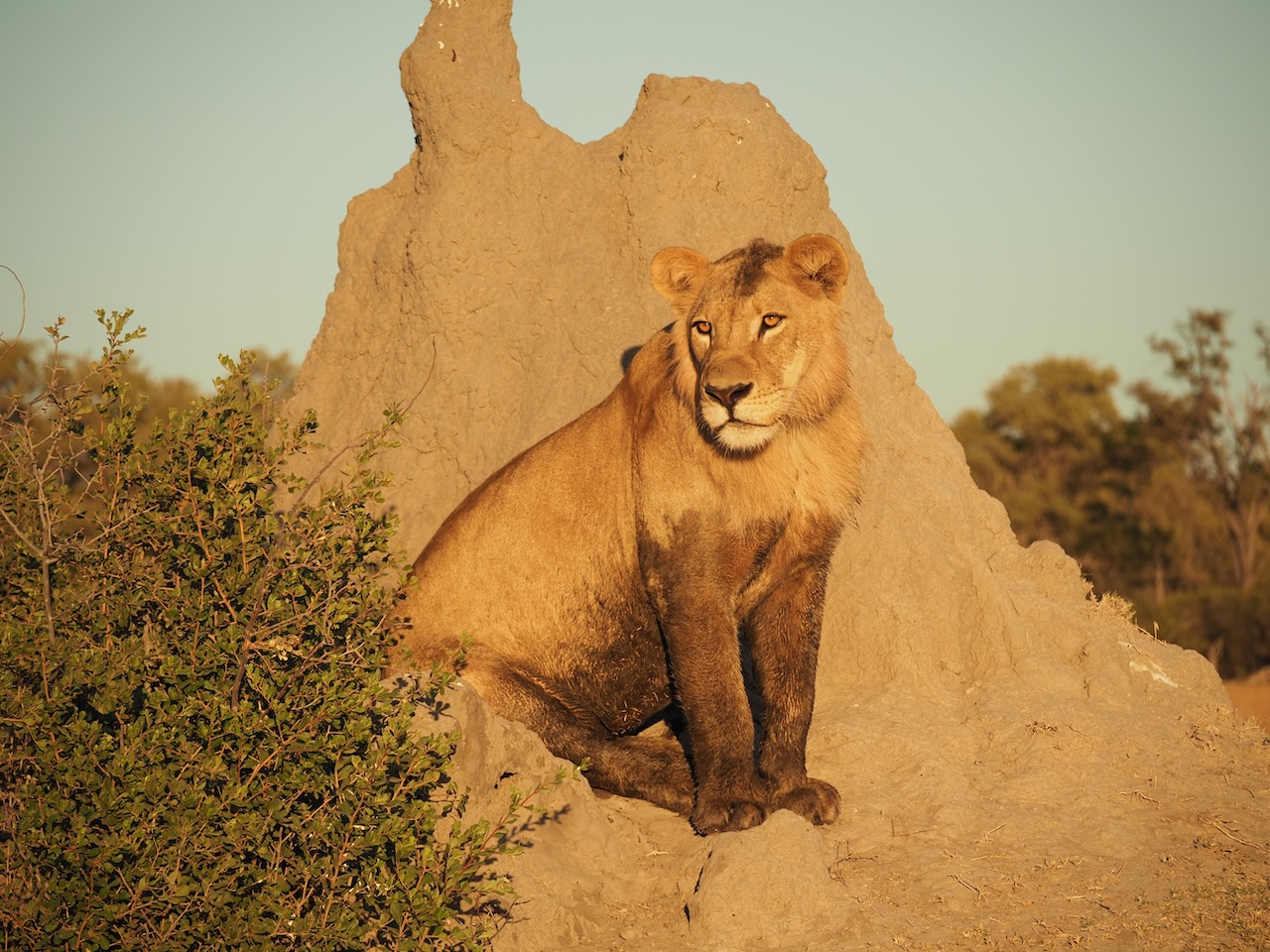

Khwai Private Reserve also produced exciting days in the bush and this area now has so many elephants. They came out in the dozens on our first day at Sable Alley Camp, walking right beside us as we were having lunch and providing quite a distraction as you'll see in my instagram video @matsonandridleysafaris . The elephants were feeding right through camp that day and prevented a few of us getting back to our rooms after lunch as they provided the kind of road block only Africa knows how to provide! (Watch my instagram video here!)
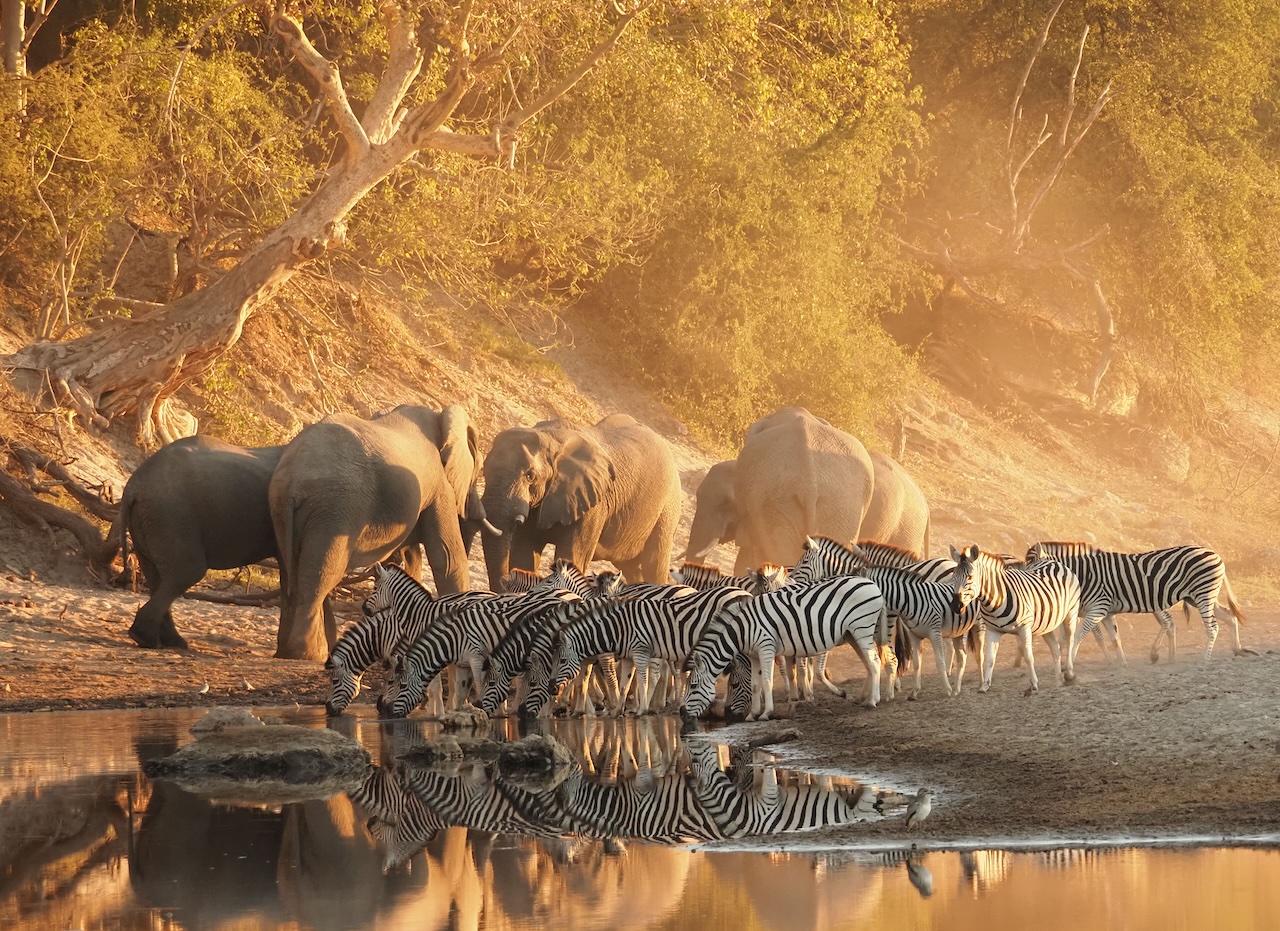
We topped off the safari with a couple of days at Meno a Kwena Camp where we enjoyed wonderful sightings of the zebra migration and lots of elephant bulls in residence. This is also one of the places to go for the traditional San Bushmen cultural experience. Check out my instagram @tammiematson to see a very cool video of the Bushmen calming a wild scorpion using the palms of their hands and mouths. It's pretty awesome!
Thank you to my wonderful group who joined me in Botswana this year and I know we will meet again in Africa soon!
If you are thinking of going on safari in 2025 or 2026, or would like to join one of my guided group safaris in Botswana, Tanzania or Rwanda, please reach out now to secure your place and to ensure we can find you space in the camps. Availability is always tight in the best areas, so planning a year in advance is the best way to ensure you have a good choice of options in your price range. With three decades of experience in African safaris and conservation, and the experience and personal touch to ensure your safari is unforgettable for all the right reasons, Matson & Ridley Safaris is here to help make African dreams come true.
Contact us today to plan your safari!
"We had no idea what to expect from a Safari in Africa. To say it exceeded our expectations is a massive understatement. We fell in love with Botswana, the people and Safaris. Tammie organised most of our trip and any extra information we needed she always came back with a quick and informative reply. We would highly recommend using Tammie and Matson Ridley Safaris and will be using them again in the future for our next safari. Thank you for an unforgettable, awe-inspiring and extraordinary experience".
Mel, Gold Coast, Australia
"From my perfectly matched roomie to the ideal group size, the epic experiences and community feel within the group. The selection of camps, the guides and staff at each of the camps were amazing. Every detail was well considered, right down to bush-babies to keep us warm. I have never experienced so many 'joy explosions'"
Janet, Cairns, Australia
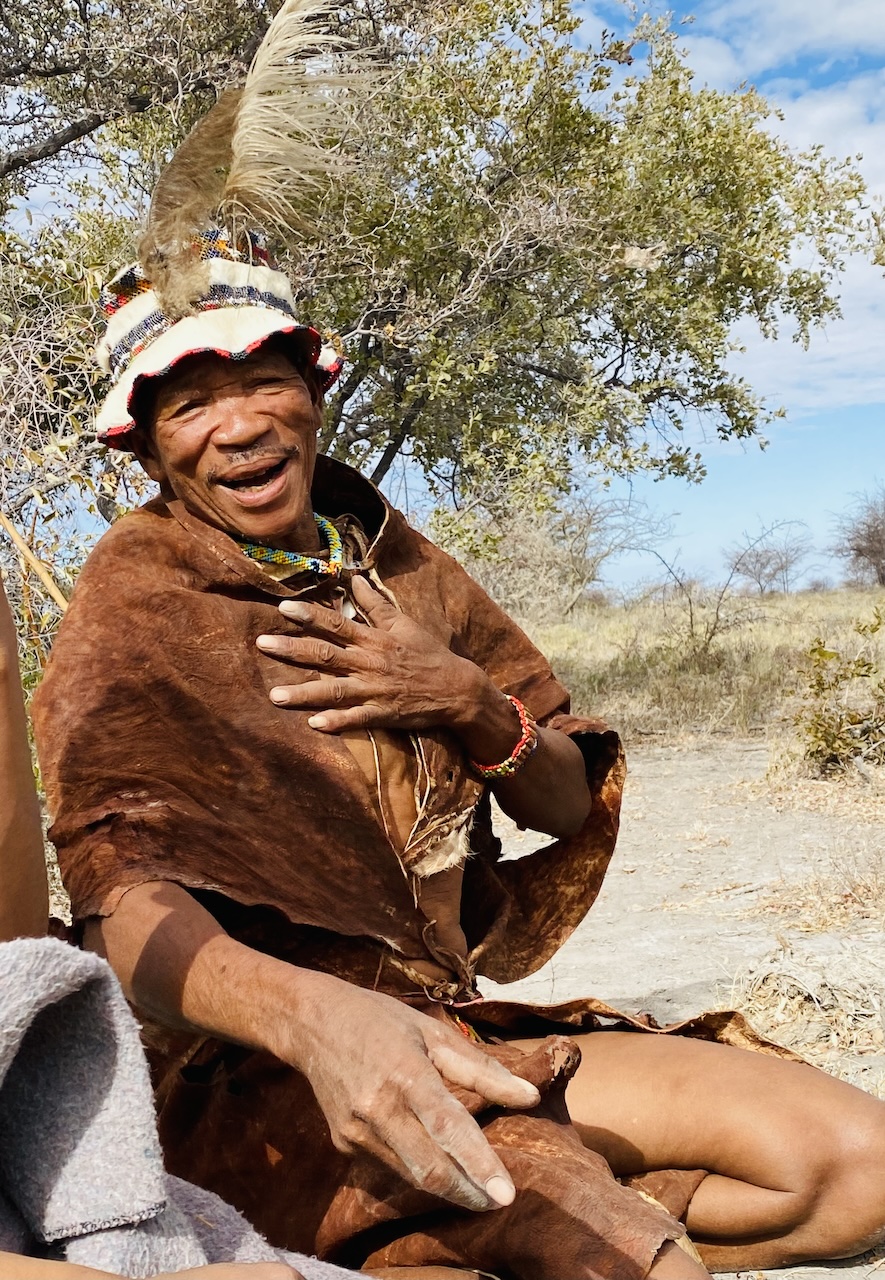
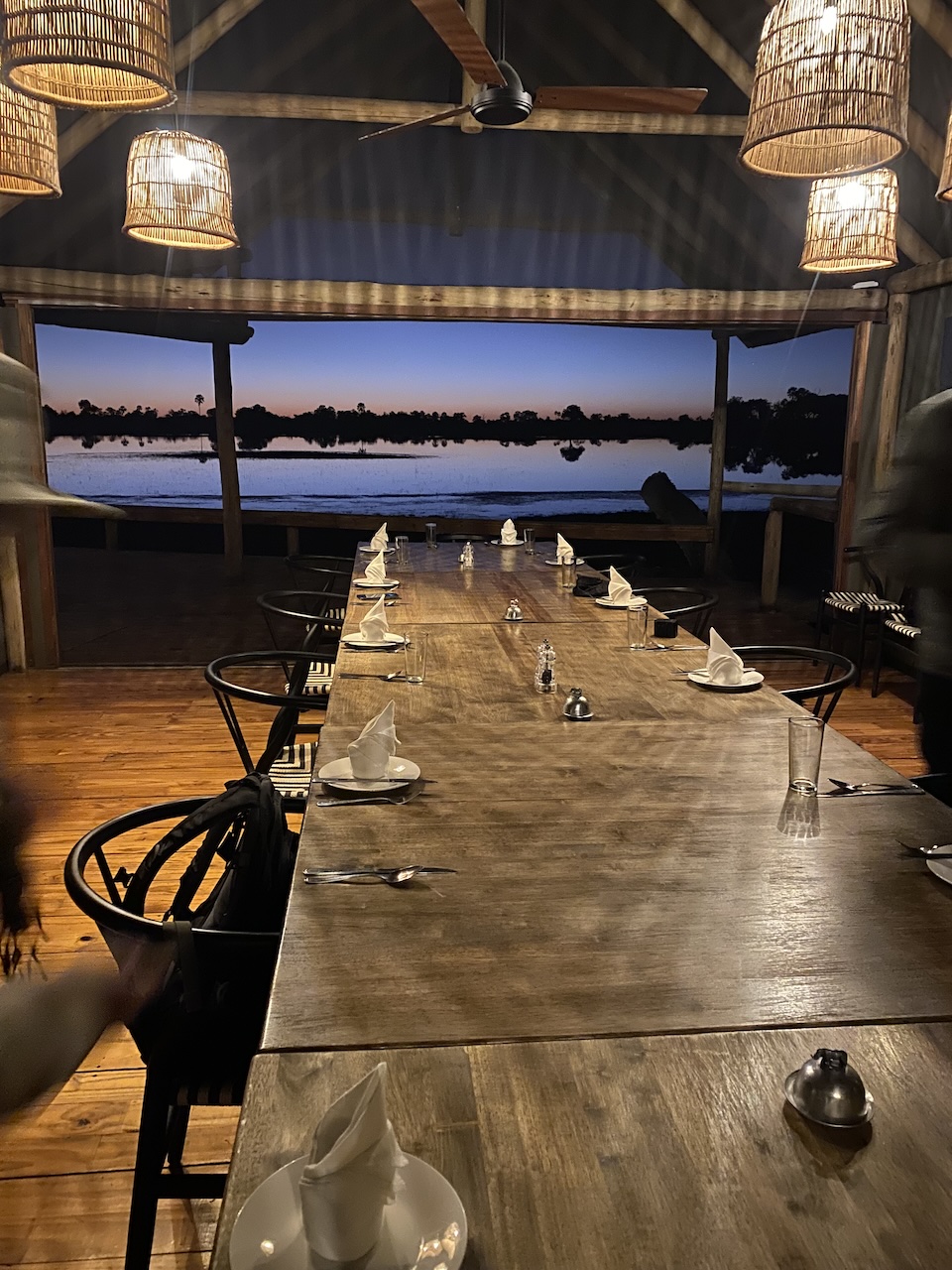
"You know you are truly alive when you are living among lions"
Isak Dinesen
It's that time of year again... I'm delighted to share the dates of my Botswana safari for 2025! Next June my small group of up to twelve travellers will join me in three of my favourite parts of Botswana. My group will explore the Okavango Delta, Khwai Private Reserve and Makgadigadi Pans National Park from 2-10 June, experiencing some of the best wildlife areas in Africa with me.
The safari kicks off at Mokolwane Camp, deep in the heart of an almost untouched part of the Okavango Delta in Xudum concession. National Geographic and Netflix film maker Brad Bestelink is based here and for good reason - the area is teeming with all the Okavango predators and has the third highest density of leopards in Africa. This small, relaxed, remote camp is tucked into 200,000 hectares of wilderness and has excellent populations of elephants, lions, giraffes, hyenas, crocodiles and hippos, as well as countless birds. Elephants love the Molokwane palms for which the camp is named.
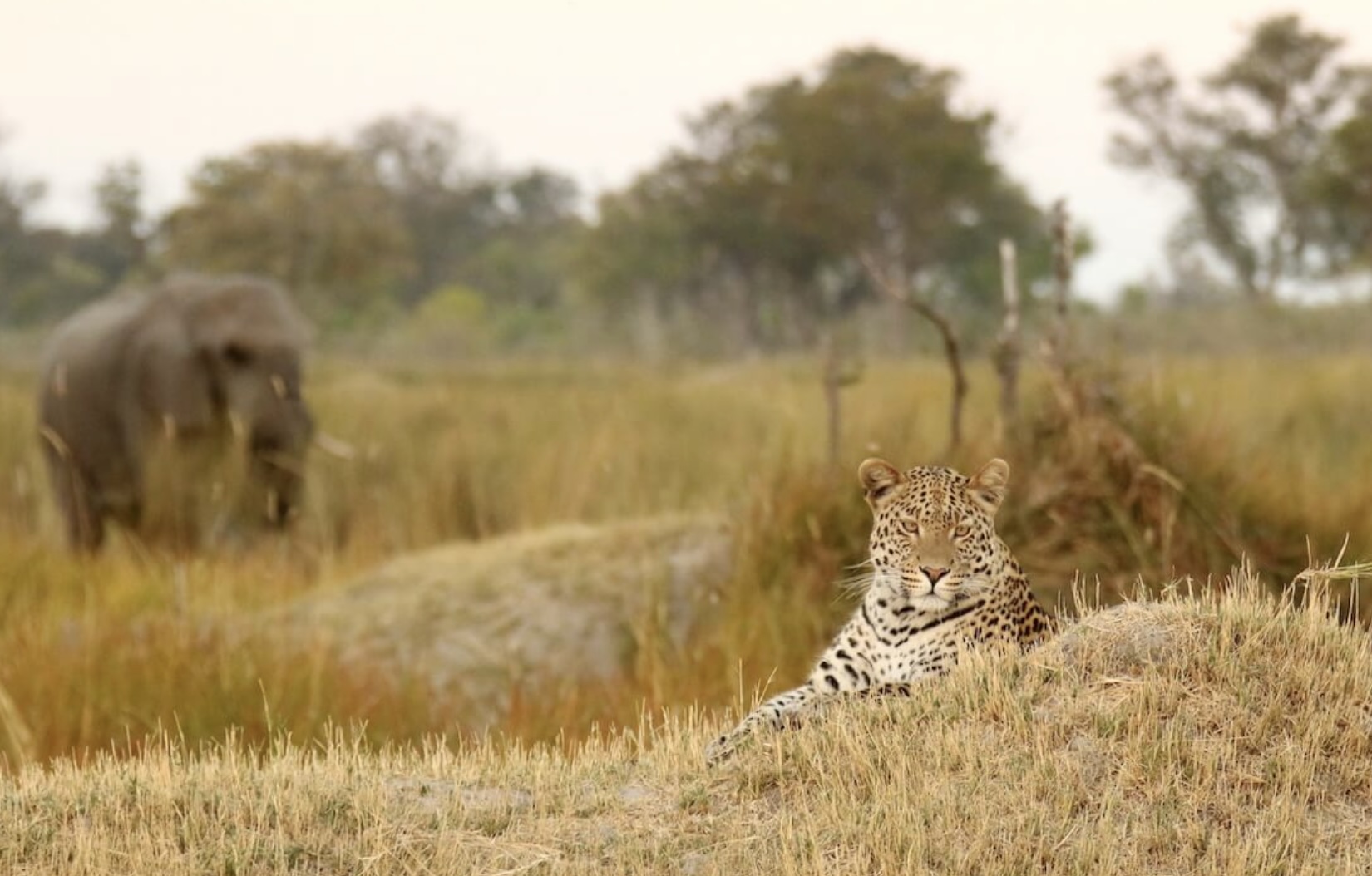
Next, we're off to Little Sable Camp in the Khwai Private Reserve, a 200,000 hectare reserve bordering the Moremi Game Reserve and Chobe National Park. On our safaris in this wildlife-rich part of Botswana we often come across critically endangered African wild dogs, leopards, lions and sometimes even cheetahs and sable antelopes. You can experience classic game drives, mokoro trips and boat safaris here (dependent on water levels). Every day is an adventure in Khwai! This camp runs in partnership with the Khwai local community, delivering direct benefits of income and jobs to local people adjoining the reserve.
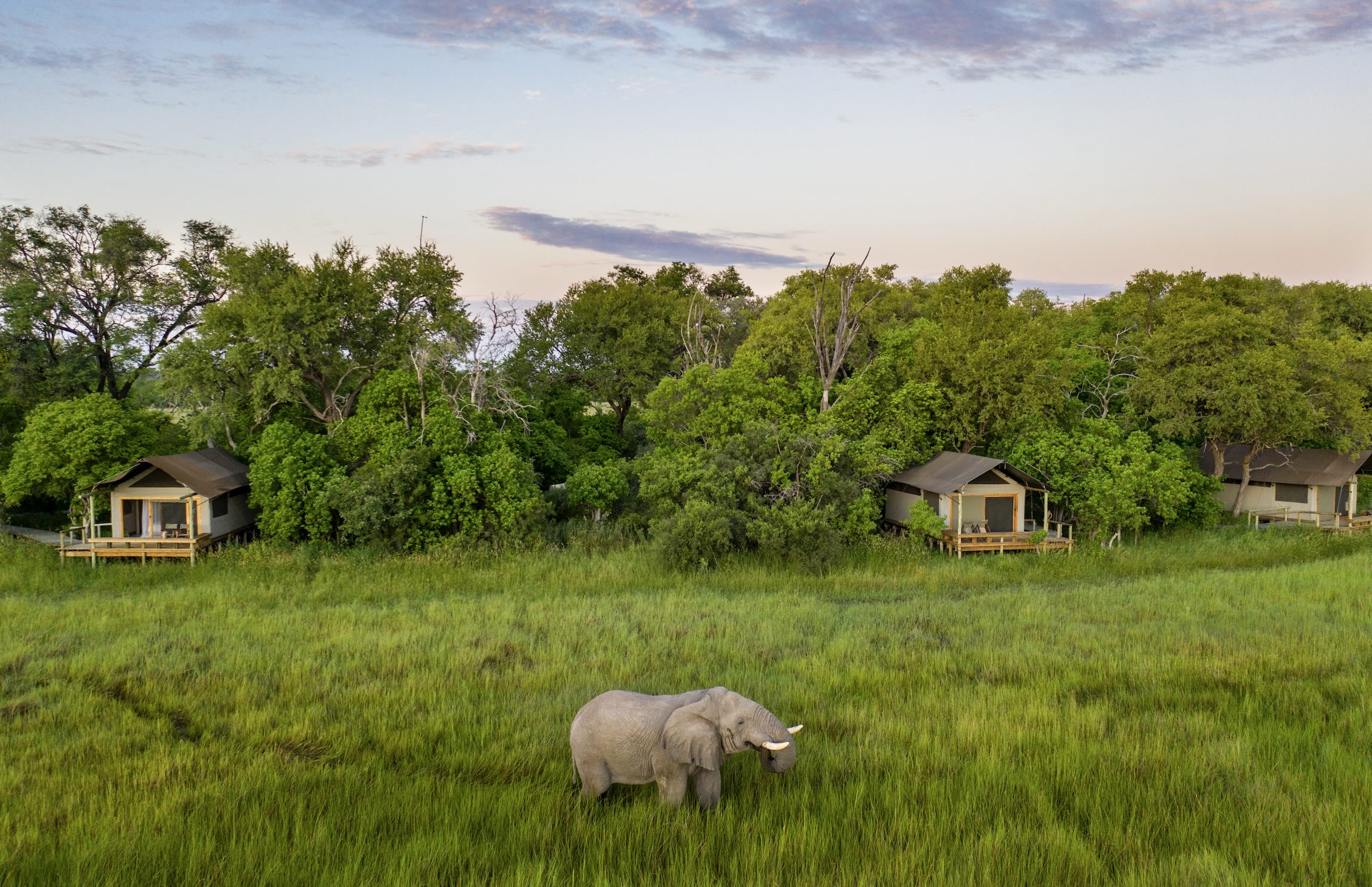
While here, you'll have the chance to spend a night at the extraordinary Skybeds. Imagine a two-level tower in the middle of the African bush overlooking a waterhole frequented by elephants. With no roof, just a mosquito net over your head, this means you'll have the most incredible view of the star-studded African sky from your cosy, warm bed. With only three skybed towers, this intimate setting is an experience like no other and you can expect to hear lots of night time visitors to the water hole. You'll have the chance to spend some time at one of our favourite wilds near this camp, which, in the late afternoon of the dry season, attracts elephants aplenty, with your view being from the level of their feet - simply incredible!
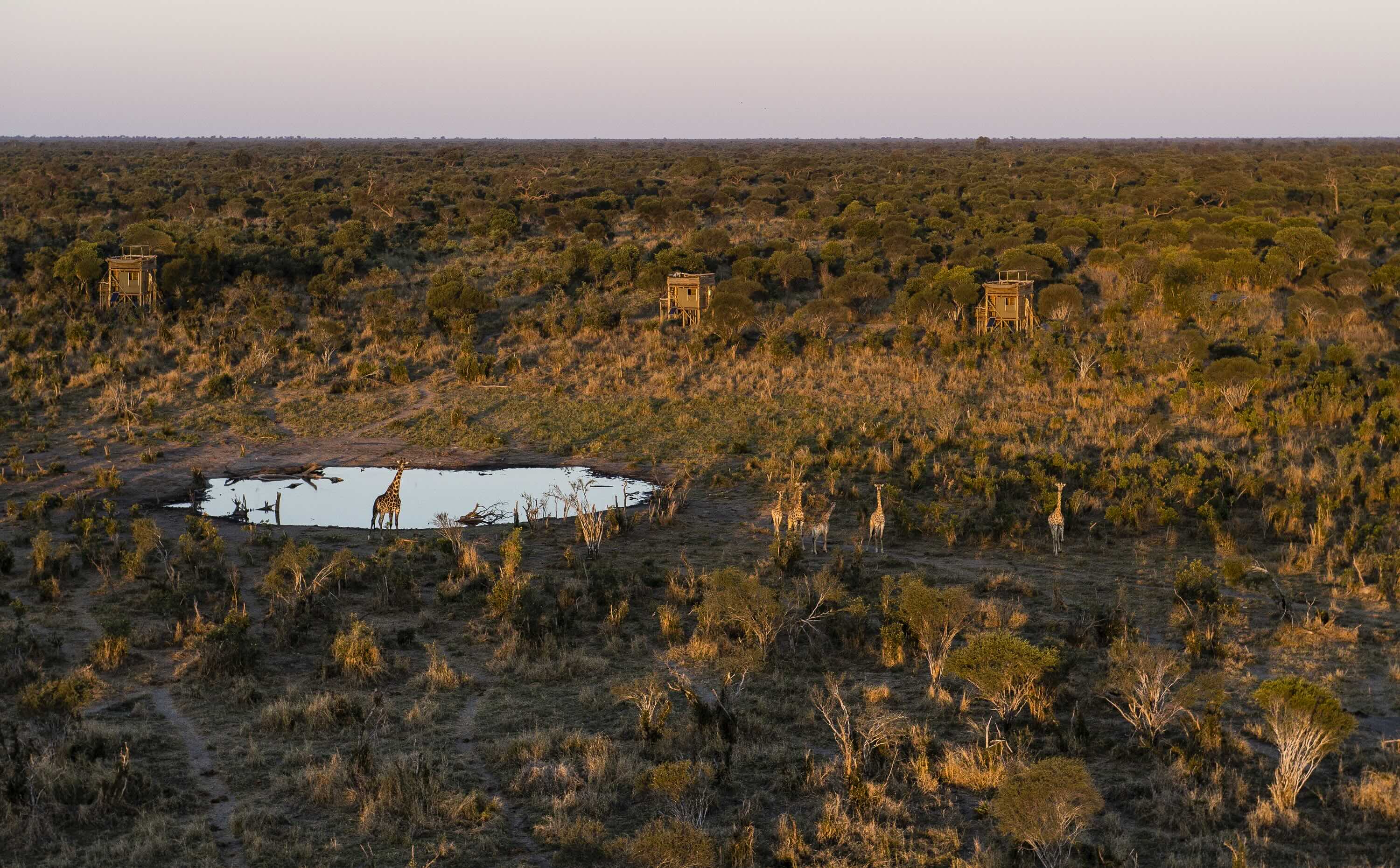
Finally, we finish our safari at Meno a Kwena Camp bordering the semi-arid Makgadigadi Pans National Park. Famous for its elevated view over the Boteti River, this camp has one of the best views of the great zebra migration that you can get. We will go into the national park to experience the zebra migration up close and also to spend time with the many elephant bulls that live in this area. An optional activity is to spend some time in Meno a Kwena's floating hide on the Boteti River for a closer view of hippos, zebras and elephants, and to spend time with the San Bushmen who live here for part of the year.
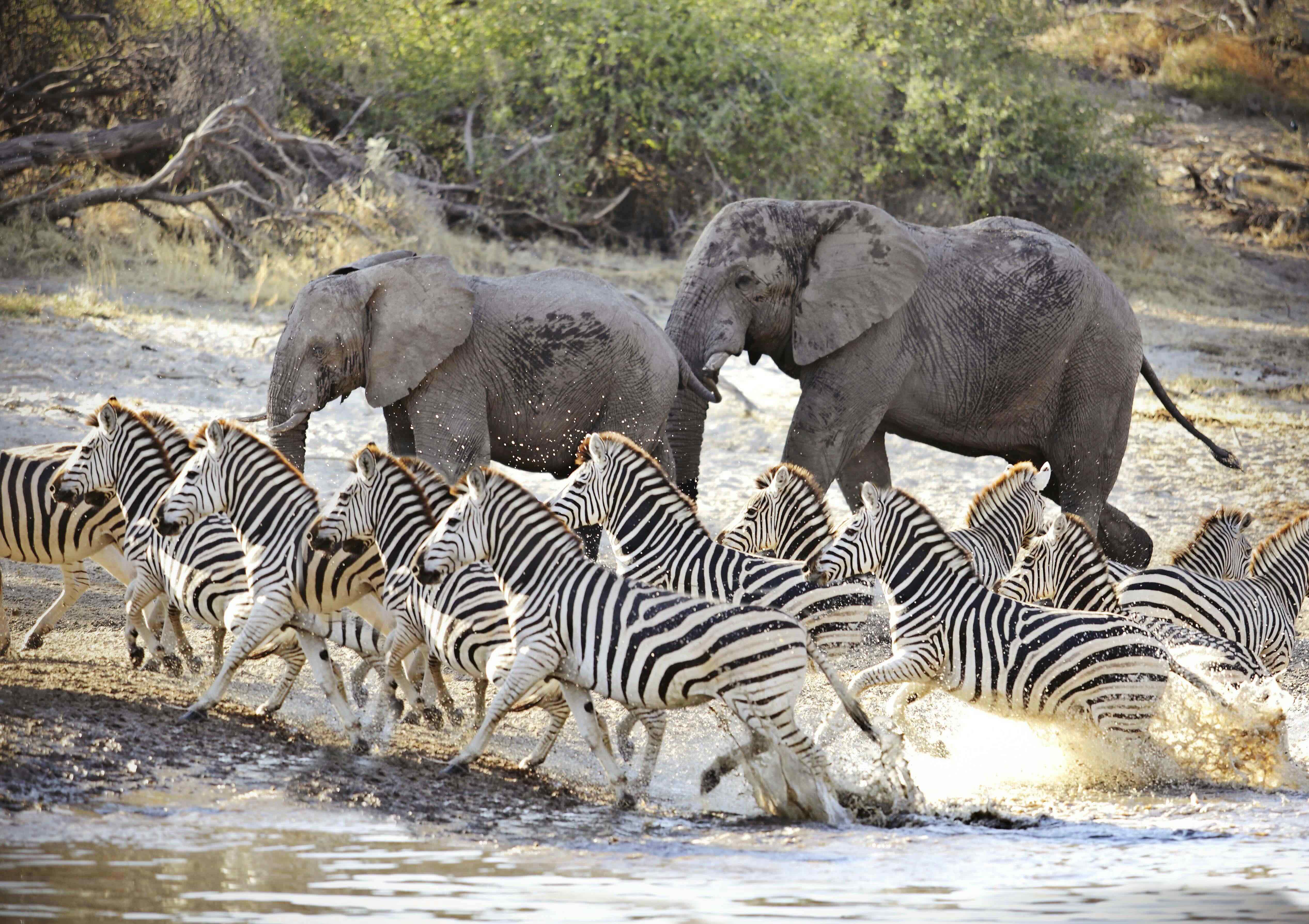
To join me on safari from 2-10 June 2025, in a group of up to twelve people, drop me a line here and I will send you the itinerary. Botswana is one of the safest and easiest places to visit in Africa, and continually provides the top notch wildlife experiences that our guests expect, which is why I take a group there every year. Our partner in our Botswana safaris is the Natural Selection Foundation and your safari directly contributes to this in addition to ensuring that the areas we're visiting are conserved for the future of wildlife and for local communities to benefit. Read more about the impact of Natural Selection safaris here.
Don't forget that in addition to the safaris I personally lead, we also have excellent local guides who can take you on safari all across Africa, from Rwanda where you can experience the mountain gorillas and chimpanzees, to Namibia's famous sand dunes and desert-adapted wildlife. We specialise in arranging safaris focused on the great migration in East Africa and have over a decade of experience of picking the timing and the places where you will experience the ultimate wildebeest migration experience. If you have a great idea for a group safari and you'd like me to lead it, do reach out for a conversation about my private guided tours. If you're thinking of going on safari any time soon, why not reach out to us for a chat about what's possible?
